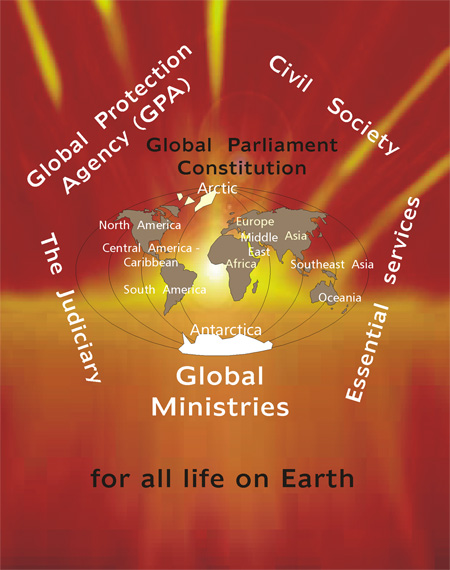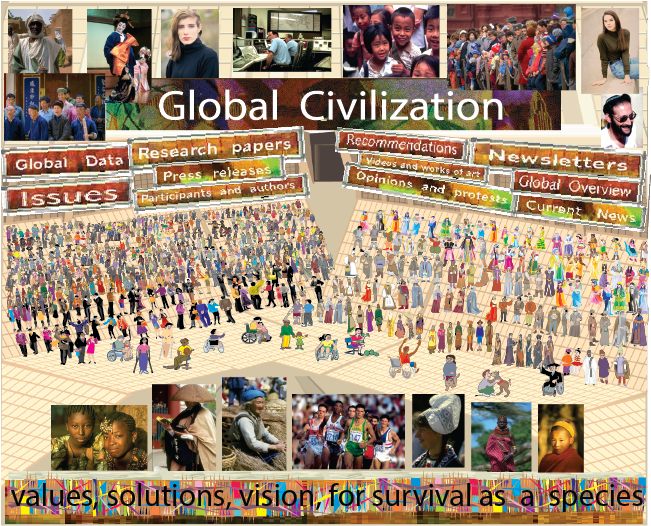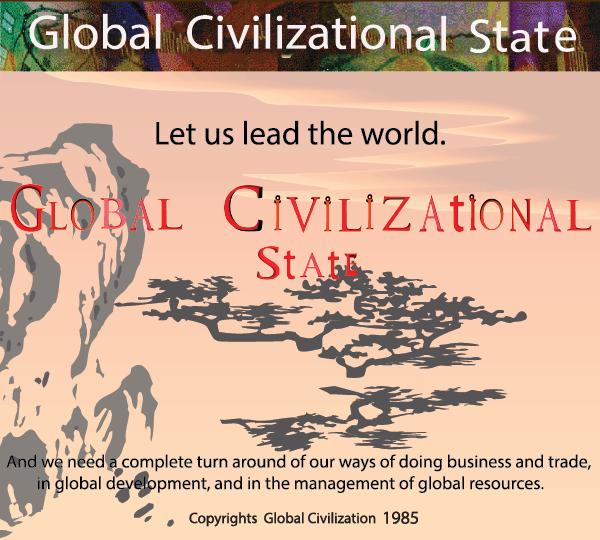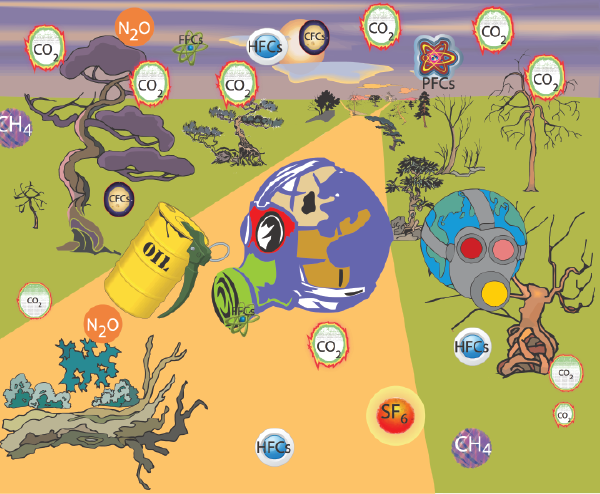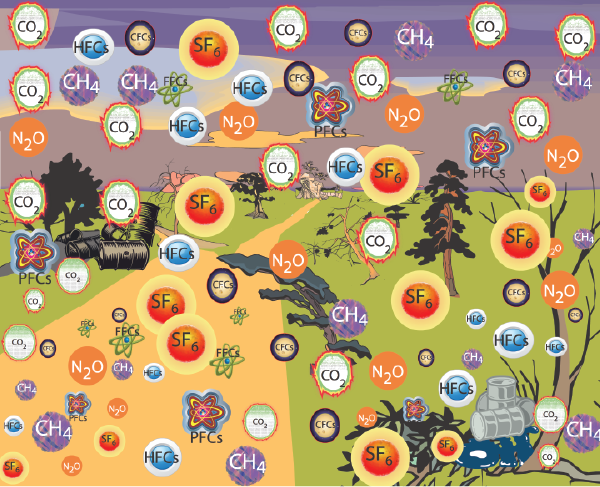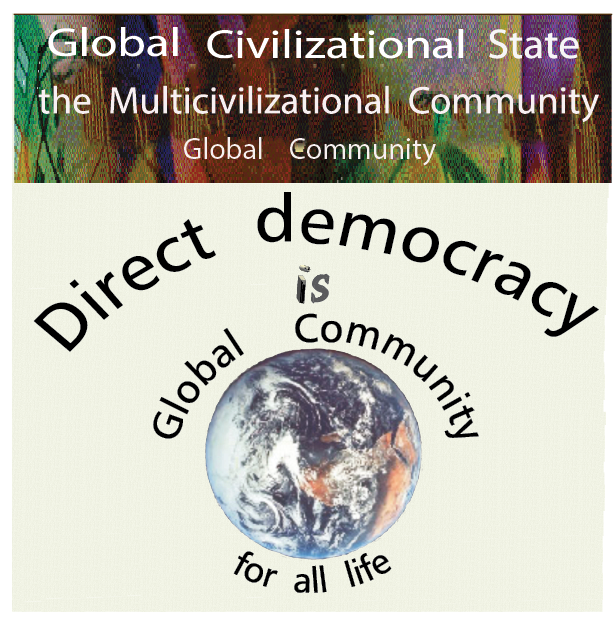

Videos promoting Global Community.
BDMV_Sept_12_2023.mp4
Sequence 01_2.3gp
TB_Sequence 01_1.mp4
Other usefull and helpful Papers to read concerning the theme of this Newsletter:
http://globalcommunitywebnet.com/Dialogue2024/Newsletters/ Nov_December2023/Israel_USA_NATO.html
http://globalcommunitywebnet.com/Dialogue2024/Newsletters/ Nov_December2023/whoownsearth.html
http://globalcommunitywebnet.com/Dialogue2024/Newsletters/ Nov_December2023/Federation_of_GGs.html
http://globalcommunitywebnet.com/Dialogue2024/Newsletters/ Nov_December2023/Parliament.html
http://globalcommunitywebnet.com/Dialogue2024/Newsletters/ Nov_December2023/gpa.html
http://globalcommunitywebnet.com/Dialogue2024/Newsletters/ Nov_December2023/GC_Direct_Democracy.html
http://globalcommunitywebnet.com/Dialogue2024/Newsletters/ Nov_December2023/index_GGNA.html
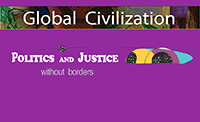


Theme for this month, November 2023.
Let us lead the world toward Global Civilizational State for education, Justice, creating a new nation, protecting Palestine and all Life on Earth, and for new ways of doing business and trade, in global development and in the management of global resources.
Table of contents.
Paper by Germain Joseph Dufour:
Israel is not a State, not a nation, not a country, not a Global Community, not a democracy and not a government. Israel is the most dangerous USA military base outside America on the planet. Israel and America do not have the rights to invade Palestine or to dissolve this nation. They never had the rights to do so. Only Global Parliament has the power and rights to create or dissolve a nation. The United Nations do not have the rights to create a new nation either, only Global Parliament has the right to do so. The United Nations, and neither the european union countries (EU), have the rights to create or dissolve a nation. Neither of them have a Constitution that they have agreed upon during a Democratic vote. Only Global Parliament has a Global Constitution has an important section that defined the Scale of Global Rights. that has been voted for and approved democratically shortly after year 1985. The Scale of Global Rights places Cultural rights and religious rights in the last section of the Scale, section no 6. Concerning Sections 4, 5 and 6 on the Scale, it shall be the aim of Global Community to secure these other rights for all global citizens within the federation of all nations, but without immediate guarantee of universal achievement and enforcement. These rights are defined as Directive Principles, obligating Global Community to pursue every reasonable means for universal realization and implementation. Effectively and essentially, "Israel" does not exist except in the wild imagination of the Jews or the Jewish people, who are an ethnoreligious group originating from the ancient Hebrews (i.e. Israelites), and whose traditional religion is Judaism. The real reason why Jews want to take over the land covering the Gaza Strip and the territory of the State of Palestine is very simple: to have the Jews billionaires, the richest people in the world, to use their money to develop the land(s), the Gaza Strip, or simply Gaza, which is a Palestinian exclave on the eastern coast of the Mediterranean Sea, bordered by Egypt on the southwest and "Israel" on the east and north. Together, the Gaza Strip and the West Bank make up the State of Palestine, which has been under "Israeli" military occupation since 1967. Those Jews billionaires will also develop Gaza not just for more Jews homes looking over a very beautiful Mediterranean Sea but also and most likely as a tourism attraction and a Bonanza i.e. a very profitable place to sell war collectibles and war art items explaining how the Jews suffer fighting the people who were living on the Palestinian territories, the two regions of the former British Mandate for Palestine that have been militarily occupied by "Israel" since the Six-Day War of 1967, namely the West Bank and the Gaza Strip. Here you can buy your art, antiques, crafts, pottery and glasses, and kinds of everything of religious and sports memorabilia.Read Paper:
http://globalcommunitywebnet.com/Dialogue2024/Newsletters/
Nov_December2023/index_Israel_not_a_nation.html
http://globalcommunitywebnet.com/Dialogue2024/Newsletters/
Nov_December2023/index_Israel_not_a_nation.htmlIII. A successful Global Civilizational State for all Life would have the following distinguishing characteristics.


It is impossible within the scope of this paper to describe, compare, and evaluate all past and present civilizations, and conclude that "A successful Global Civilizational State for all Life" would have the following distinguishing characteristics. Nevertheless, let us see what can be found within the context of today civilizations, what are possible surviving solutions for life on Earth, and even attempt to promote a system of global governance consisting of a more meaningful world union in the form of nine or more Global Governments and Global Parliament.
Human history stretches through generations, and is the history of civilizations. Civilization and culture both refer to the overall way of life of a people, and involve the values, beliefs, norms, institutions, social structures, and modes of thinking to which successive generations in a given society. The composition and shapes of civilizations change over time, the cultures of peoples interact and overlap. A short list of values humans have developed over time to survive as a species are shown here.
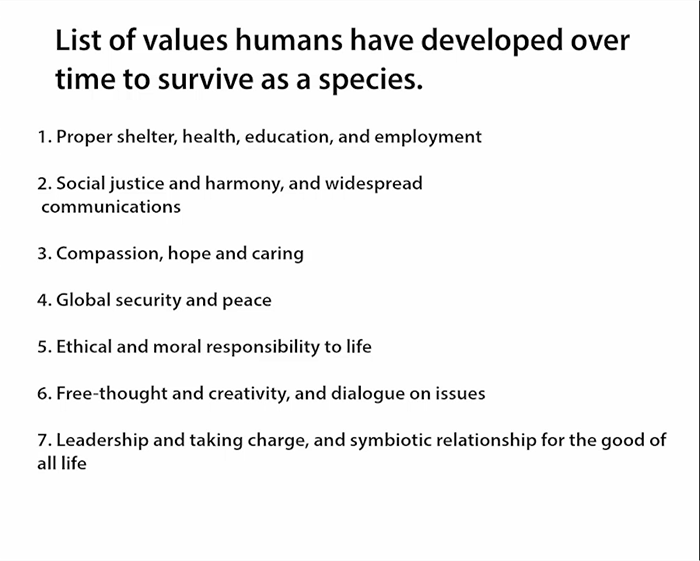
People have shared a few fundamental values and institutions throughout history, which may explain some constants in human behavior but it cannot explain history, which consists of changes in human behavior.
If the term civilization is elevated to what is common to humanity as a whole then the largest cultural groupings of people would be a single Global Civilizational State, that is a variety of cultures, of peoples, of religious worlds, of historical traditions, and of historically formed attitudes.
The development and evolution of the West are in large part the factors which enabled the West to take the lead in modernizing itself and non-Western societies. These factors were truly concepts, practices, and institutions have been more prevalent in the West than in non-Western civilizations. Over time, characteristics of Western civilization have been defined by religion and moral principles, human rights, language, ancestry, history, ethnic groups, customs and laws, and also by maintaining a meaningful independent existence, and ways of life. America is the distinct core-state civilization of the West. Inevitably, the fate of the United States within the West grouping of states depends upon Americans asserting strongly once more their commitment to Western civilization and today, their commitment to the Global Civilizational State which is seen by global citizens as the guardian, custodian and embodiment of Western civilization.
The effect of the expansion of the West has promoted both the modernization and the Westernization of non-Western societies. However modernization does not necessarily mean Westernization. Non-Western societies can modernize and have modernized without abandoning their own cultures and adopting wholesale Western values, institutions, and practices. In short, modernization has meant a great victory and achievement of Global Civilizational State on Earth.
The attitudes, values, knowledge, and culture of people in a modern society differ greatly from those in a traditional society. As the first civilization to modernize, the West leads in the acquisition of the culture of modernity. As other societies acquire similar patterns of education, work, wealth, and class structure, the argument runs, this modern Western culture will become the new culture for Global Civilizational State. Modern societies could resemble each other more than do traditional societies because the increased interaction among modern societies may not generate a common culture but it does facilitate the transfer of techniques, inventions, and practices from one society to another with a speed and to a degree that were impossible in the traditional world.
The components of order in today's more complex and heterogenous world are found within and between civilizations. The world will be ordered on the basis of civilizations or not at all. In this world the core states of civilizations are sources of order within civilizations and, through negotiations with other core states, between civilizations.
Because of modernization, global politics today is being reconfigured along cultural lines and civilizations. And of course, Global Civilizational State is finally giving its historical place as the global solution to saving humanity, and all other lifeforms on Earth, from complete extinction. Peoples and countries with similar cultures are coming together. Alignments defined by ideology and superpower relations are giving way to alignments defined by culture and civilization. A civilization may also include people who share in and identify with its culture, but who live in states dominated by members of another civilization. Civilizations usually have one or more places viewed by their members as the principal source or sources of the civilization's culture. These sources are often located within the core state or states of the civilization, that is, its most powerful and culturally central state or states.
In modern era, Western civilization, the West, is referred to the European-American civilization and America has become the land of freedom, equality, opportunity, the future, and is a distinct core-state civilization. Not so much ideologies, simply economics and politics now differentiate peoples of different civilizations. Nevertheless, cultures, ways of life, ways of doing things have been the most distinguishing characteristics. Those characteristics have been defined by religion, language, ancestry, history, communities, ethnic groups, customs, nations, and also by major levels of classification being civilizations.
In a multicivilizational world, there are core values which different ethnic and religious societies have in common. The constructive course is to renounce global culture, accept diversity, and seek commonalities. Commonalities exist between Asia and the West. Whatever the degree to which humankind is divided, the world's major religions, Western Christianity, Orthodoxy, Hinduism, Buddhism, Islam, Confucianism, Taoism, Judaism, also share key values in common. A more inclusive Global Civilizational State can emerge gradually through the exploration and expansion of these commonalities. Peace in a multicivilizational world is the finding of those commonalities and so peoples in all civilizations should search for and attempt to expand the values, institutions, and practices they have in common with peoples of other civilizations.
IV. Federation of Global Governments.

The Global Government of North America ( GGNA ) is certainly a good example of a type of Global Government. Welcome to your Global Community, the Multicivilizational Community, and Global Civilizational State, and let us all continue to strengthen Direct Democrac and world institutions in ways that would further decrease the risk of human extinction.
Earth Court of Justice (for a government model based on a democratically elected Global Government). In 2024, Global Community celebrates its 39th year since its formation in 1985. More significant and meaningful actions needed to save the Earth, all Life. Watch animation promoting participation. (41 MBs) Global Community will celebrate its 35th year in 2020. Prepare now! More significant and meaningful actions needed to save the Earth, all life. Global Civilizational State dependable and trustworthy leadership to guard over and care for all life on Earth.
A group project for you, could be a school project: send us your own short version of Global Parliament's Constitution. It has to be developed from the actual longer version approved by Global Parliament. Depending on the level of participation, we may have different categories for this special project.
Global Parliament will be reviewing all proposals.
During the Ceremonies of Global Dialogue 2010,a special Award
will be given to the group with the best short version.
Global Parliament Legislative acts
Ratification of Global Parliament's Constitution
Read the Table of Contents of Global Parliament's Constitution.
The 29 Chapters of Global Parliament Constitution
[ Preamble ] [ Chapter I ] [ Chapter II ] [ Chapter III ] [ Chapter IV ] [ Chapter V ] [ Chapter VI ] [ Chapter VII ] [ Chapter VIII ] [ Chapter IX ] [ Chapter X ] [ Chapter XI ] [ Chapter XII ] [ Chapter XIII ] [ Chapter XIV ] [ Chapter XV ] [ Chapter XVI ] [ Chapter XVII ] [ Chapter XVIII ] [ Chapter XIX ] [ Chapter XX ] [ Chapter XXI ] [ Chapter XXII ] [ Chapter XXIII ] [ Chapter XXIV ] [ Chapter XXV ] [ Chapter XXVI ] [ Chapter XXVII ] [ Chapter XXVIII ] [ Chapter XXIX ]
A) How 'Direct Democracy' works: GlobalVotingontheNet.htm
B) Development report on Direct Democracy
C) Global Community overall picture on Direct Democracy
Global Community stands for a Direct Democracy based on the fact that land, air, water, oil & gas, all minerals, space, and the electromagnetic spectrum are all natural resources, and rightly belong to Global Community as a birthright, and they are for sharing as per the Scale of Global Rights. It is about Politics and Justice without borders for all Life on Earth. And it is about our Global Community Constitution meaning.
Global Community must now direct the wealth of the world towards the building of local-to-global economic democracies (Direct Democracy) in order to meet the needs for food, shelter, universal healthcare, education, and employment for all.

Direct Democracy implies that:
Direct Democracy and global voting on issues
Global Community stands for a Direct Democracy.

Global Community, what we stand for.

Global Community, a global Direct Democracy for all Peoples.

What makes Life on planet Earth habitable for all species?

Humanity's new Vision of the world.

Global Community is Earth for all Life.

What makes Earth suitable for all life?

VI. Global law, codes and standards aspects and issues.
VII. How we can save the world from extinction, and the complete disappearance of species from Earth.

VIII. Replacing the 1948 Universal Declaration of Human Rights by the Scale of Global Rights Scale of Global Rights.

Global Civilizational State: the application of the Scale of Global Rights to the most important global issues threatening humanity's survival worldwide.
- I. Global Civilizational State affiliated centres for education and training.
- II. Global Civilizational State values, solutions, vision, for humanity's survival and that of all life, on our planet.
- III. Global Civilizational State complete turn around of our ways of doing business and trade, in global development, and in the management of global resources.
- IV. Global Civilizational State Federation of Global Governments (FGGs).
- V. Global Civilizational State 4 types of essential services.
- VI. Global Civilizational State peace, global justice for all life-forms, and protection of the global life-support systems on our planet.
- VII. Global Civilizational State references.

XI. Global Community Direct Democracy, the Multicivilizational Community, and Global Civilizational State.

Global Community stands for a Direct Democracy based on the fact that land, air, water, oil & gas, all minerals, space, and the electromagnetic spectrum are natural resources, and rightly belong to Global Community as a birthright, and they are for sharing as per the Scale of Global Rights.
XII. Sustainable Global Civilization.

XIII. Global Protection Agency (GPA).

To act as a Global Protection Agency, as the GPA aspires to do, many foundations must be laid, especially regarding the move from wielding power derived from Global Parliament to legitimate global leadership. There are many required characteristics that are prerequisite for legitimate leadership.
Building global communities requires a mean to enforce global law that protects all life on Earth.GCEG Global Protection Agency will train and lead a global force, bypassing traditional peacekeeping and military bodies such as the United Nations and NATO. This is a great opportunity for globallateralism.
Global Protection Agency (GPA) is leading a group of people in the world who participate in:
a) peacekeeping or peacemaking mission;
b) creating global ministries for:
1. the policy response to the consequences of the global warming, and
2. the development of strategies to adapt to the consequences of the unavoidable climate change.

d) saving the Earth's genetic heritage;
e) keeping the world healthy and at peace;
f) protecting the global life-support systems and the eco-systems of the planet;
g) dealing with the impacts of: global poverty, lack of drinking water and food, global warming and the global climate change, threat to security, conflicts and wars, lack of good quality soil for agriculture, polluted air, water and land, overcrownded cities, more new and old diseases out of control, widespread drugs, human and Earth rights abuses, world overpopulation, and lack of resources;
h) broadening the traditional focus of the security of states to include both the security of people as well as that of the planet. Global security policies include:
* every person on Earth has a right to a secure existence, and all states have an obligation to protect those rights
* prevention of conflicts and wars; identification, anticipation, and resolving conflicts before they become armed confrontations. The Earth Court of Justice will help here.
* military force is not a legitimate political instrument
* weapons of mass destruction are not legitimate instruments of national defence
* eliminate all weapons of mass destruction from all nations and have inspectors verifying progress to that effect
* all nations should sign and ratify the conventions to eliminate nuclear, chemical and biological weapons
* the production and trade in arms should be listed as a criminal act against humanity; this global ministry will introduce a Convention on the curtailment of the arms trade, a provision for a mandatory Arms Register and the prohibition of the financing or subsidy of arms exports by governments
* the development of military capabilities is a potential threat to the security of people and all life on Earth; the ministry will make the demilitarization of global politics a high priority.
* anticipating and managing crises before they escalate into armed conflicts and wars
* maintaining the integrity of the environment and global life-support systems
* managing the environmental, economic, social, political and military conditions that threatened the security of people and all life on the planet.

Hamas is an Islamist militant movement and one of the Palestinian territories’ two major political parties. Hamas, an acronym for Harakat al-Muqawama al-Islamiya (“Islamic Resistance Movement”), was founded by Sheikh Ahmed Yassin, a Palestinian cleric who became an activist in local branches of the Muslim Brotherhood after dedicating his early life to Islamic scholarship in Cairo. Beginning in the late 1960s, Yassin preached and performed charitable work in the West Bank and Gaza, both of which Israel occupied following the 1967 Six-Day War.
Yassin established Hamas as the Brotherhood’s political arm in Gaza in December 1987, following the outbreak of the first intifada, a Palestinian uprising against Israeli occupation of the West Bank, Gaza, and East Jerusalem. At the time, Hamas’s purpose was to counter Palestinian Islamic Jihad (PIJ), another organization whose commitment to violently resisting Israel threatened to draw Palestinians’ support away from the Brotherhood. In 1988, Hamas published its charter, calling for the destruction of Israel and the establishment of an Islamic society in historic Palestine. In what observers called an attempt to moderate its image, Hamas presented a new document [PDF] in 2017 that accepted an interim Palestinian state along the “Green Line” border established before the Six-Day War but that still refused to recognize Israel.
Hamas first employed suicide bombing in April 1993, five months before PLO leader Yasser Arafat and Israeli Prime Minister Yitzhak Rabin signed the Oslo Accords. The historic pact established limited self-government for parts of the West Bank and Gaza under a newly created entity called the Palestinian Authority (PA). Hamas condemned the accords, as well as the PLO’s and Israel’s recognition of each other, which Arafat and Rabin officially agreed to in letters sent days before Oslo.
In 1997, the United States designated Hamas a foreign terrorist organization. The movement went on to spearhead violent resistance during the second intifada, in the early 2000s, though PIJ and Fatah’s Tanzim militia were also responsible for violence against Israelis.
Yassin established Hamas as the Brotherhood’s political arm in Gaza in December 1987, following the outbreak of the first intifada, a Palestinian uprising against Israeli occupation of the West Bank, Gaza, and East Jerusalem. At the time, Hamas’s purpose was to counter Palestinian Islamic Jihad (PIJ), another organization whose commitment to violently resisting Israel threatened to draw Palestinians’ support away from the Brotherhood. In 1988, Hamas published its charter, calling for the destruction of Israel and the establishment of an Islamic society in historic Palestine. In what observers called an attempt to moderate its image, Hamas presented a new document [PDF] in 2017 that accepted an interim Palestinian state along the “Green Line” border established before the Six-Day War but that still refused to recognize Israel.
Hamas first employed suicide bombing in April 1993, five months before PLO leader Yasser Arafat and Israeli Prime Minister Yitzhak Rabin signed the Oslo Accords. The historic pact established limited self-government for parts of the West Bank and Gaza under a newly created entity called the Palestinian Authority (PA). Hamas condemned the accords, as well as the PLO’s and Israel’s recognition of each other, which Arafat and Rabin officially agreed to in letters sent days before Oslo.
In 1997, the United States designated Hamas a foreign terrorist organization. The movement went on to spearhead violent resistance during the second intifada, in the early 2000s, though PIJ and Fatah’s Tanzim militia were also responsible for violence against Israelis.
It governs more than two million Palestinians in the Gaza Strip, but the group is best known for its armed resistance to Israel. In October 2023, Hamas launched a massive surprise attack on southern Israel, killing hundreds of civilians and soldiers and taking dozens more as hostages. Israel has declared war on the group in response and indicated its military is planning for a long campaign to defeat it. Dozens of countries have designated Hamas a terrorist organization, though some apply this label only to its military wing.
Iran provides it with material and financial support, and Turkey reportedly harbors some of its top leaders. Its rival party, Fatah, which dominates the Palestine Liberation Organization (PLO) and rules in the West Bank, has renounced violence. The split in Palestinian leadership and Hamas’s unwavering hostility toward Israel have diminished prospects for stability in Gaza.

Gaza’s economic situation was already dire before Hamas’s 2023 assault on Israel, and the ensuing war is almost certain to exacerbate the extreme poverty of its residents. Egypt and Israel largely closed their borders with it in 2006–07, restricting the movement of goods and people into and out of the territory. The two countries maintain a blockade today, cutting off the territory from most of the world and forcing more than one million Gazan Palestinians to rely on international aid. Israel has allowed Qatar to provide hundreds of millions of dollars in assistance through Hamas. Other foreign aid generally reaches Gaza via the PA and UN agencies.
For years after the blockade began, Hamas collected revenue by taxing goods moving through a sophisticated network of tunnels that circumvented the Egyptian crossing into Gaza; this brought staples such as food, medicine, and cheap gas for electricity production into the territory, as well as construction materials, cash, and arms. After Egyptian President Abdel Fatah al-Sisi took power in 2013, Cairo became hostile toward Hamas, which it saw as an extension of its chief domestic rival, the Muslim Brotherhood.
The Egyptian army shut down most of the tunnels breaching its territory while it waged a counterterrorism campaign against a branch of the self-proclaimed Islamic State on its side of the border, on the Sinai Peninsula. Egypt began to allow some commercial goods to enter Gaza through its Salah al-Din border crossing in 2018. As of 2021, Hamas reportedly collected upward of $12 million per month from taxes on Egyptian goods imported into Gaza.
Today, Iran is one of Hamas’s biggest benefactors, contributing funds, weapons, and training. Though Iran and Hamas briefly fell out after backing opposing sides in Syria’s civil war, Iran currently provides some $100 million annually [PDF] to Hamas, PIJ, and other Palestinian groups designated as terrorist organizations by the United States. Iran was quick to praise Hamas’s assault on Israel in late 2023 and pledge its continuing support for the Palestinian group.
Turkey has been another stalwart backer of Hamas—and a critic of Israel—following President Recep Tayyip Erdogan’s rise to power in 2002. Though Ankara insists it only supports Hamas politically, it has been accused of funding Hamas’s terrorism, including through aid diverted from the Turkish Cooperation and Coordination Agency.
Hamas has been the de facto authority in Gaza since shortly after Israel withdrew from the territory in 2005. The following year, Hamas won a majority of seats in the PA’s legislature and formed a government. It earned votes for the social services it provided and as a rejection of the incumbent Fatah, which many voters perceived as having grown corrupt at the helm of the PLO and delivering little to Palestinians through its negotiations with Israel. The outcome was unacceptable to Fatah and its Western backers, and the party ousted Hamas from power in the West Bank. In Gaza, Hamas routed Fatah’s militias in a week of fighting, resulting in a political schism between the two Palestinian territories. Palestinians have not voted for a legislature since 2006, nor a president since 2008.
As Hamas took over the remnants of PA institutions in the strip, it established a judiciary and put in place authoritarian institutions. In theory, Hamas governs in accordance with the sharia-based Palestinian Basic Law, as does the PA; but it has generally been more restrictive than the law requires, including by controlling how women dress and enforcing gender segregation in public during the early years of its rule. The watchdog group Freedom House found in 2020 that the “Hamas-controlled government has no effective or independent mechanisms for ensuring transparency in its funding, procurements, or operations.” Hamas also represses the Gazan media, civilian activism on social media, the political opposition, and nongovernmental organizations (NGOs), leaving it without mechanisms for accountability.
The political bifurcation of the West Bank and Gaza is widely unpopular: a June 2023 poll [PDF] by the Palestinian Center for Policy and Survey Research (PCPSR) showed that one-third of Palestinians consider it the most damaging development for their people since the state of Israel’s 1948 creation. The same poll found that more than half of Palestinians in Gaza and the West Bank would vote for Hamas’s Haniyeh over PA President Mahmoud Abbas in a presidential election, while just one-third of Palestinians would choose Abbas. Additionally, Abbas has indefinitely postponed national elections scheduled for 2021, citing Israel’s alleged refusal to let Palestinians in East Jerusalem vote, though observers suspect that Abbas aims to prevent a likely Hamas victory.
Hamas has fired rockets and mortars into Israel since the group took over the Gaza Strip in the mid 2000s. Iranian security officials have said that Tehran provided some of these weapons, but that Hamas gained the ability to build its own missiles after training with Iran’s Islamic Revolutionary Guard Corps (IRGC) and proxies. In recent years, Israel estimated that Hamas and other Palestinian militant groups in Gaza had about thirty thousand rockets and mortars in their arsenal. Hamas militants have flown balloons carrying incendiary devices toward Israel, which have sometimes caused fires. The group has also carried out incursions into Israeli territory, killing and kidnapping soldiers and civilians.
Prior to the 2023 conflict, Hamas and Israel had their deadliest fighting in years in 2021, when Hamas fired rockets into Israel following weeks of tensions between Palestinians and Israelis in Jerusalem. Some analysts say that Hamas wanted to bolster its reputation as the defender of the Palestinian cause after the PA postponed the 2021 elections. During the eleven-day conflict, Hamas and PIJ fired more than four thousand rockets from Gaza, killing ten Israeli civilians and injuring more than three hundred others. Hamas reportedly coordinated with the IRGC and Lebanon’s Hezbollah during the fighting, and used so-called suicide drones along with its usual arsenal of less precise missiles. The United States and Egypt brokered a cease-fire to the conflict.
Hamas’s assault on southern Israel this year, which the group’s leaders have called “Operation Al-Aqsa Storm,” was extraordinary in its strategy, scale, and secrecy, analysts say. It began early in the morning on October 7, the Jewish Sabbath and an important Jewish holiday, with Hamas launching several thousand rockets into southern and central Israel, hitting cities as far north as Tel Aviv. Hamas militants also breached the heavily fortified Gaza border and infiltrated many southern Israeli towns and villages, killing hundreds of Israeli troops and civilians, and wounding and kidnapping scores more.
Hamas’s military leader, Mohammed Deif, said the group undertook its assault because of Israel’s long-running blockade of Gaza, its occupation of Palestinian lands, and its alleged crimes against Muslims, including the desecration of Al-Aqsa Mosque in Jerusalem.
It is the deadliest attack on Israeli soil in decades and has inflicted a deep psychological trauma on the Israeli people, with some analysts drawing comparisons to the surprise Pearl Harbor and September 11, 2001, attacks on the United States. Israeli and U.S. intelligence agencies reportedly had no indications that Hamas was planning an assault of this nature. It is completely unprecedented that a terrorist organization would have the capacity or the wherewithal to mount coordinated, simultaneous assaults from the air, sea, and land.
Israel has declared war on Hamas and countered with intensifying air strikes on targets in Gaza and ground operations to push the group’s militants out of the country. The government has ordered the evacuation of all civilians from Israeli communities bordering Gaza. Prime Minister Benjamin Netanyahu has warned of a “long and difficult war” against Hamas, and Israel’s military response is expected to be extraordinary, if not unprecedented.
Some observers are questioning if Israel will attempt a full-scale invasion and reoccupation of the Palestinian territory, a campaign that could incur heavy casualties on both sides. Israel had mounted numerous military operations against Hamas since its takeover in 2007, two years after Israel pulled out of Gaza. But these were mostly from the air. And even when Israeli troops were deployed, they never stayed for long.
An Israeli invasion of Gaza could also provoke a significant attack against Israel by Hezbollah, the Iran-backed militant group in Lebanon, risking a wider conflagration in the region, analysts say. Iran is, of course, a patron of Hezbollah, as well as Hamas and other Palestinian militant groups, and there is an ever-present danger of a two-front conflict, which would devastate parts of Israel and much of Lebanon, where Hezbollah is based.
Israel is not a State, not a nation, not a country, not a Global Community, not a democracy, and not a government.
Israel is the most dangerous USA military base outside America on the planet.
Read the Paper:
http://globalcommunitywebnet.com/Dialogue2024/Newsletters/
Nov_December2023/index_Israel_not_a_nation.html
III. Global Justice for all Life.

Theme for this month, Nov_December2023.
Israel and Palestine only one possible solution: Global Parliament, Direct Democracy, and the Scale of Global Rights.
by
Germain Joseph Dufour.
I am
President of Global Parliament
Global Civilizational Community
Multicivilizational Community
Global Community
and also President
of my own Canadian business for global trade, and website:
Global Community WebNet Ltd.
globalcommunitywebnet.com
Take time to listen to our videos.
Many of the Videos might be too large to open for you on the Internet. Sorry!
And welcome to all of you Global Citizens.
Global Community, Global Parliament, Federation of Global Governments, Global Civilizational State
.
Return to Global Dialogue 2024
Return to Global Community activities.
Videos promoting the subject matter, and global issues of November-December Newsletters, along with the values, principles, and history of Global Community.
Summary of 101 links with pictures and expository texts.

Global Community voting on issues
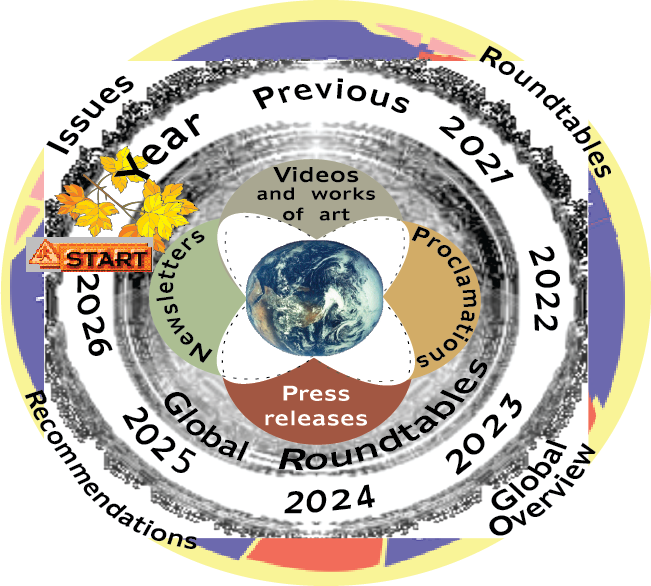




Politics and Justice without borders
The planet-Life-Soul of Humanity symbiotical relationship
which brings up a question
Who owns the Earth?
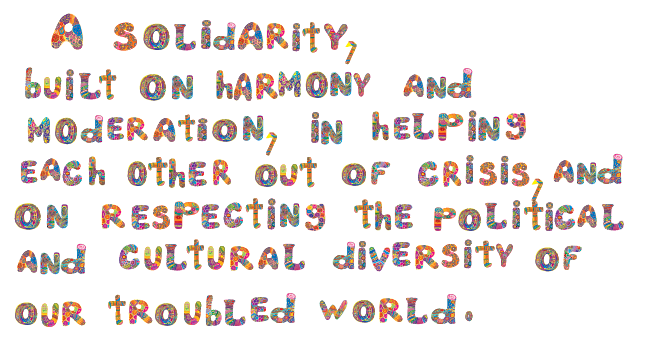


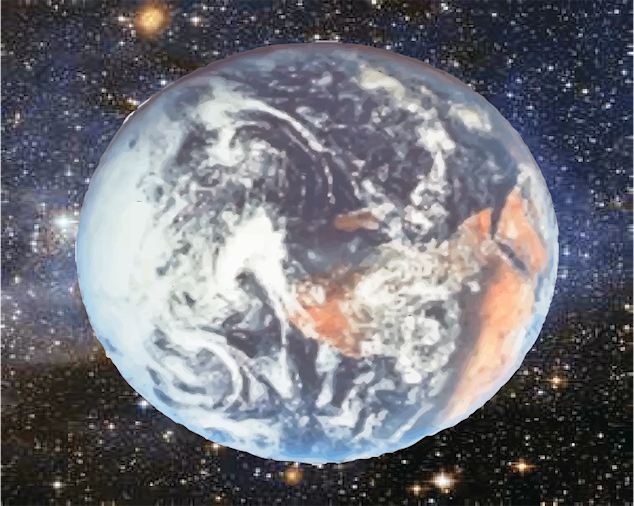
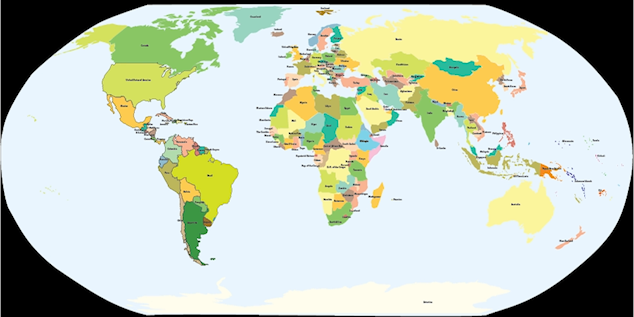

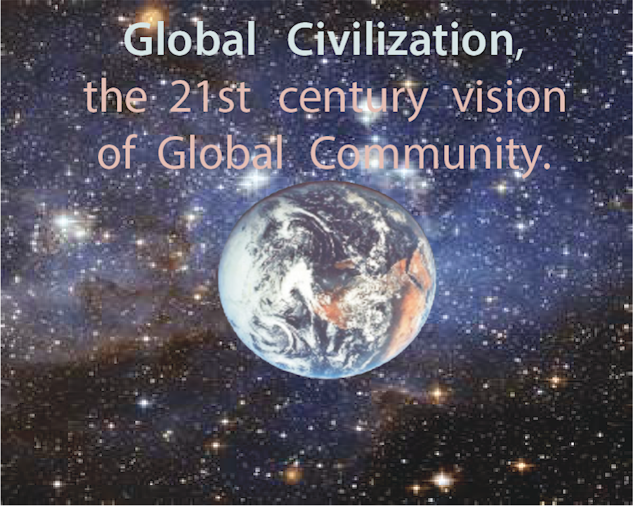
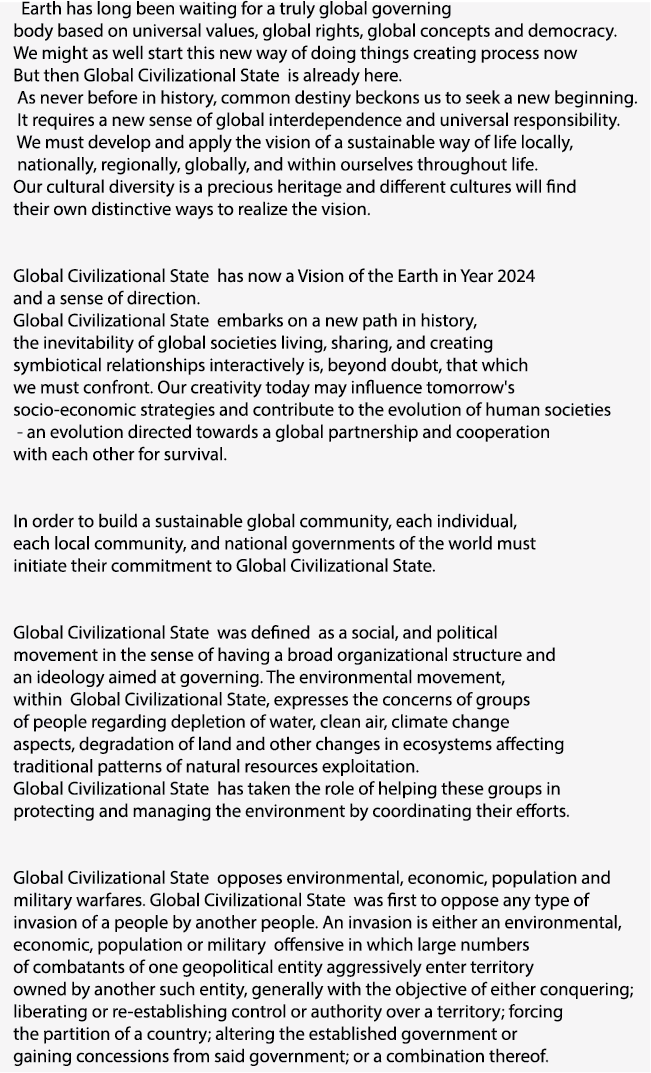
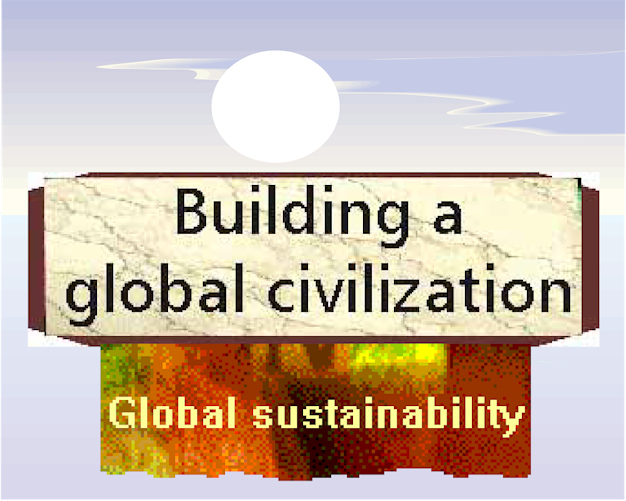
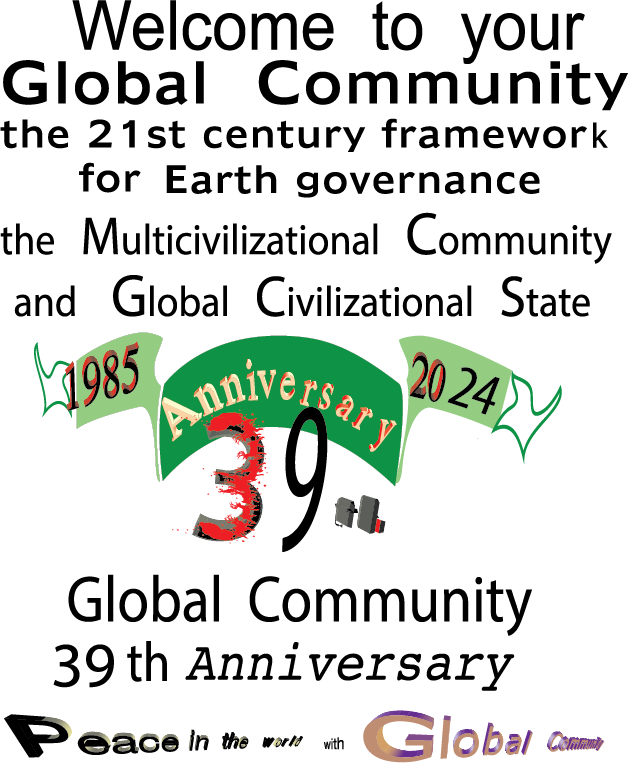


Welcome to your Global Community Activities. Learn about your Global Dialogue activities over the past decades of research work..

The idea of creating global dialogues was first brought forward in a report on global changes published in 1990 by Germain Dufour. The report contained 450 policies (workable sound solutions) on sustainable development, and was presented to the United Nations, the Government of Canada, the provincial government of Alberta and several non-profit organizations and scientists.
There was a need at the time for helping humanity back onto the path of survival this millennium. There is still a need for such help and most likely will continue to be so forever.
Global dialogues are the source of new ideas and finding new ways for our survival and taking along with us other lifeforms on the planet.
The people of Global Community, are using global dialogues to resolve conflicts, promote democracy, and fight hunger, terrorism, disease, and human rights abuses.
In order to bring about the event of peace, Global Community is offering other good organizations around the world to work together to bring warring parties to peace. We can accomplish this task by concrete actions such as:
a) Tracking armed conflicts within and between nations around the world and offering assistance in dispute resolution;
b) Promoting human rights and democracy;
c) Monitoring democratic elections;and
d) Educating the public about the advantages of a peaceful solution to any conflict. Global Community also proposes that all nations of the world promote the Scale of Human and Earth Rights and the criteria to obtain the Global Community Citizenship.
Every global community citizen lives a life with the higher values described in the Scale and the criteria. Global community citizens are good members of the human family. Most global problems, including global warming and world overpopulation, can be managed through acceptance of the Scale and the criteria.
Global Community can contribute in evaluating options and strategies for adapting to climate change as it occurs, and in identifying human activities that are even now maladapted to climate. There are two fundamental types of response to the risks of climate change:
1. reducing the rate and magnitudes of change through mitigating the causes, and
2. reducing the harmful consequences through anticipatory adaptation.
Mitigating the causes of global warming implies limiting the rates and magnitudes of increase in atmospheric concentrations of greenhouse gases, either by reducing emissions or by increasing sinks for atmospheric CO2. Reducing the harmful consequences can be achieved by co-operating together with the global ministries on climate change and emergencies.
Global Community has created the https://globalcommunitywebnet.com/globalcommunity/globalministries.htm global ministries to help humanity be prepared to fight the harmful consequences of a global warming through anticipatory adaptation. The global ministries on climate change and emergencies are now operating. The ministries have developed:
1. policy response to the consequences of the global warming, and
2. strategies to adapt to the consequences of the unavoidable climate change.
Global Community has given back responsibility to every citizen on Earth. Everyone shares responsibility for the present and future well-being of life within Global Community. We will work together in working out sound solutions to local and global problems. It would be wrong and dishonest to blame it all on the leader of a country. Most problems in the world must find solutions at the local and global community levels (and not assume that the leader alone is responsible and will handle it).
There is a wisdom in the ways of very humble people that needs to be utilized. Every humble person deserves to have ideas respected, and encouraged to develop his or her own life for the better. Sound solutions to help manage and sustain Earth will very likely be found this way. Everyone can help assess the needs of the planet and propose sound solutions for its proper management, present and future.
Everyone can think of better ideas to sustain all life on Earth and realize these ideas by conducting positive and constructive actions. When there is a need to find a solution to a problem or a concern, a sound solution would be to choose a measure or conduct an action, if possible, which causes reversible damage as opposed to a measure or an action causing an irreversible loss; that is the grassroots process. Global Community can help people realized their actions by coordinating efforts efficiently together.
The responsibility of a peacemaker is to settle differences through compromise and negotiation before they erupt into violence. Conflicting views do not have to bring about fighting. War is an irreversible solution to a problem. War is never an appropriate solution to resolve a conflict. Global Community is promoting the settling of disputes between nations through the process of the Earth Court of Justice.
Earth Court of Justice (for a model based on a democratically elected Global Government).

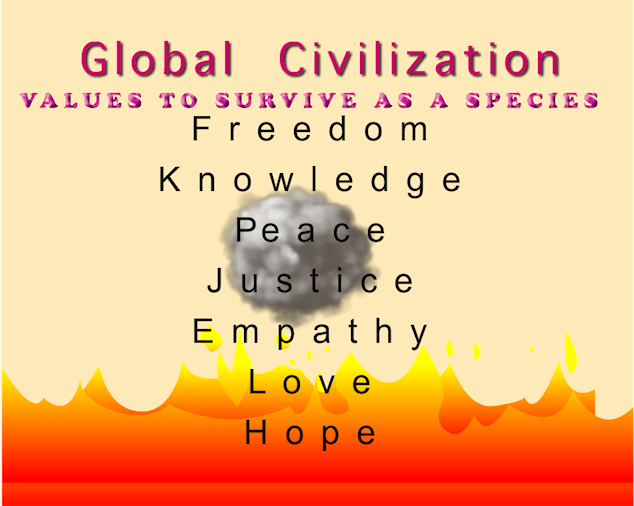
In 2024, Global Community celebrates its 39th year since its formation in 1985. More significant and meaningful actions needed to save the Earth, all Life.
Watch animation promoting participation. (41 MBs)

Global Civilizational State dependable and trustworthy leadership to guard over and care for all life on Earth.
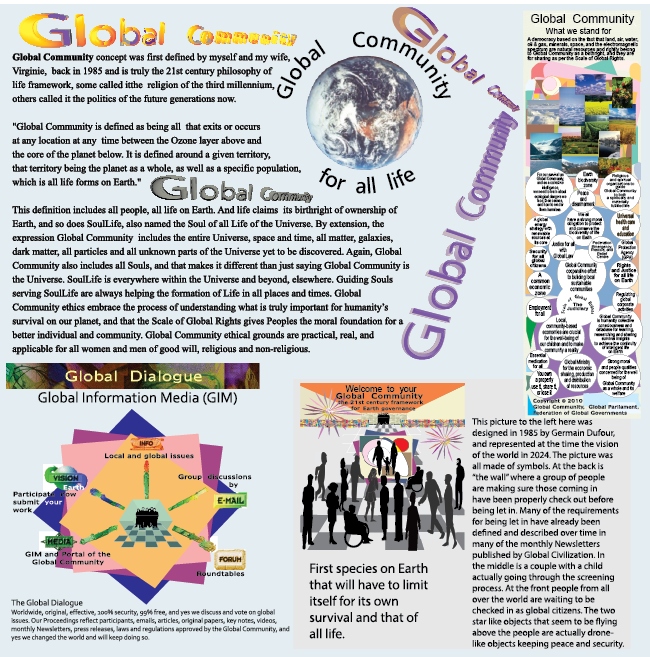
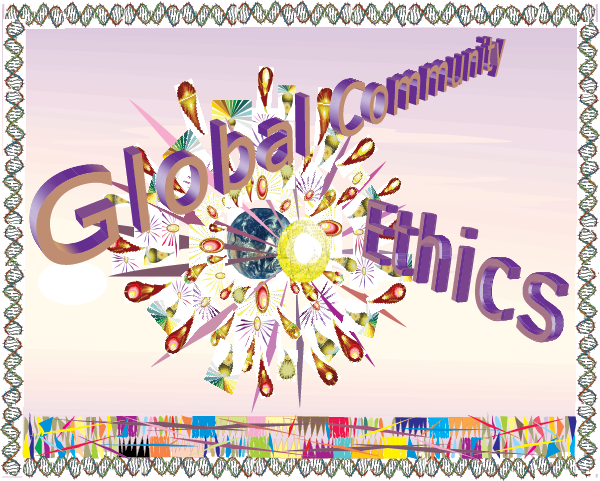
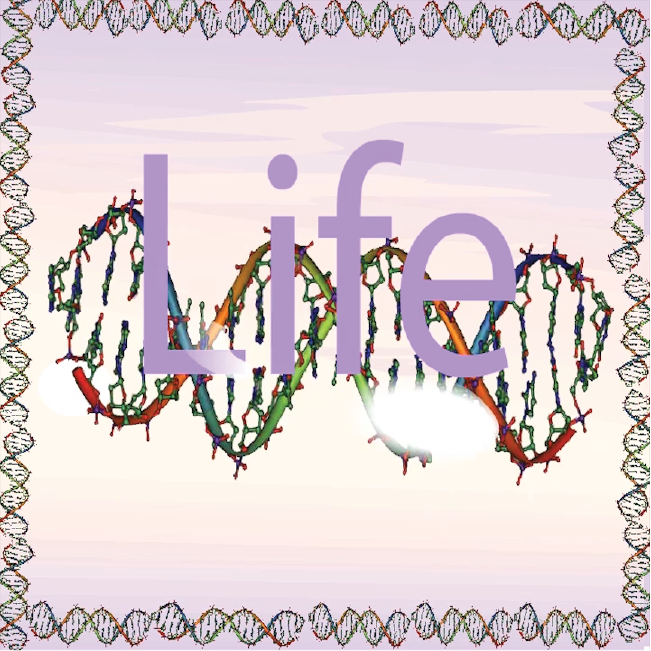
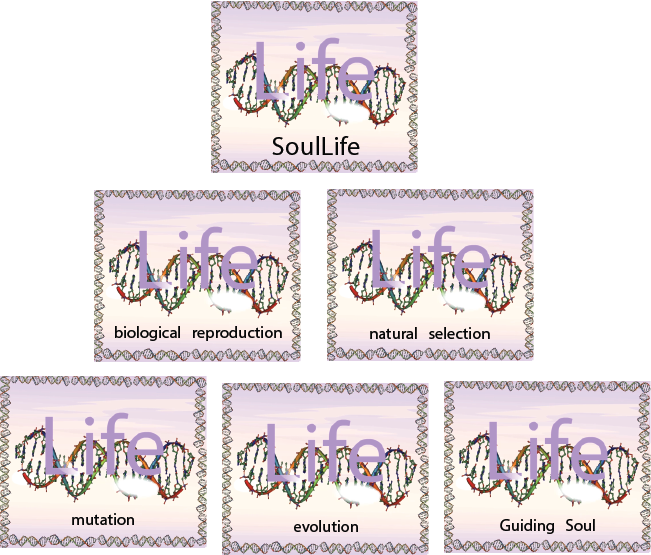
More significant and meaningful actions are needed to save the qualities that make us human, such as the ability to love and have compassion, be creative, and not be a robot or alien.Global Community celebrates its 39th year in 2024. More significant and meaningful actions are needed to save the qualities that make us human, such as the ability to love and have compassion, be creative, and not be a robot or alien, and to save Humanity's new vision of the world, the Earth, and all life on our planet.
Papers and animations regarding Global Community 39th year achievements and celebration from its beginning in 1985 to 2024.
visionofearth2024.mp4
GIMnews.mp4
globalcrisis.mp4
longtermsolutions.mp4
Members6.mov
china.mp4
( see enlargement
)
Evolution, creation and now, Global Civilizational State from 1985 to 2024.
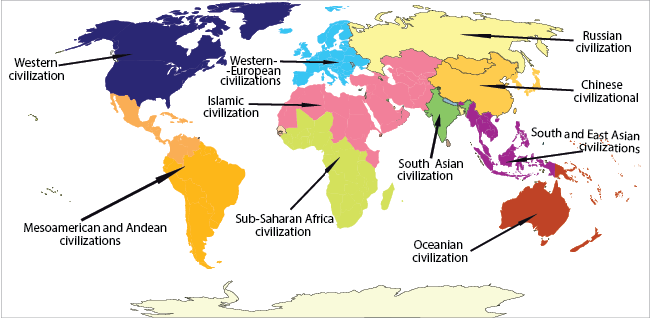
All world civilizations have values, solutions to handle issues, and a vision for survival as a species.
The UN Security Council seeks to address threats to international security. Its five permanent members, chosen in the wake of World War II, have veto power. The Security Council fosters negotiations, imposes sanctions, and authorizes the use of force, including the deployment of peacekeeping missions. Global Community and its Global Protection Agency will be asked to replace the UN to help our overpopulated world managed our ways relating to the production, buying, and selling of goods or services.
The UN has no military forces of its own, and Member States provide, on a voluntary basis, the military and police personnel required for each peacekeeping operation.
The United Nations is an international organization founded in 1945 and committed to maintaining international peace and security; developing friendly relations among nations; promoting social progress, better living standards and human rights.
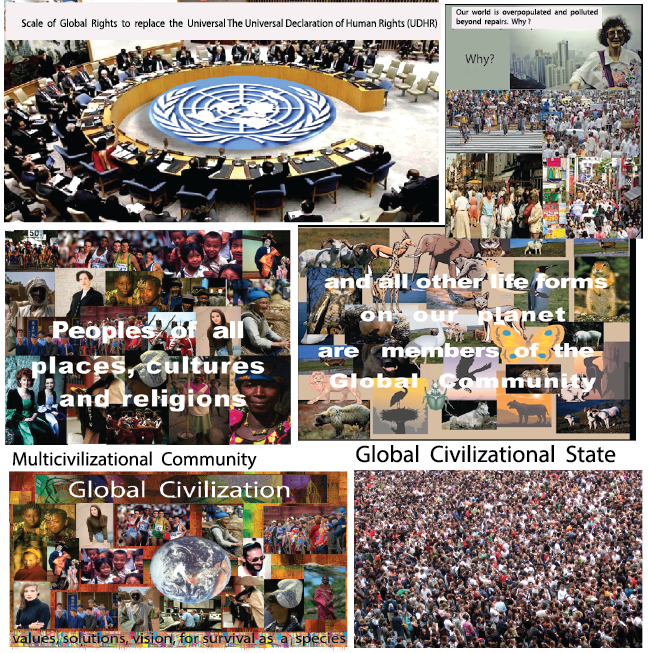
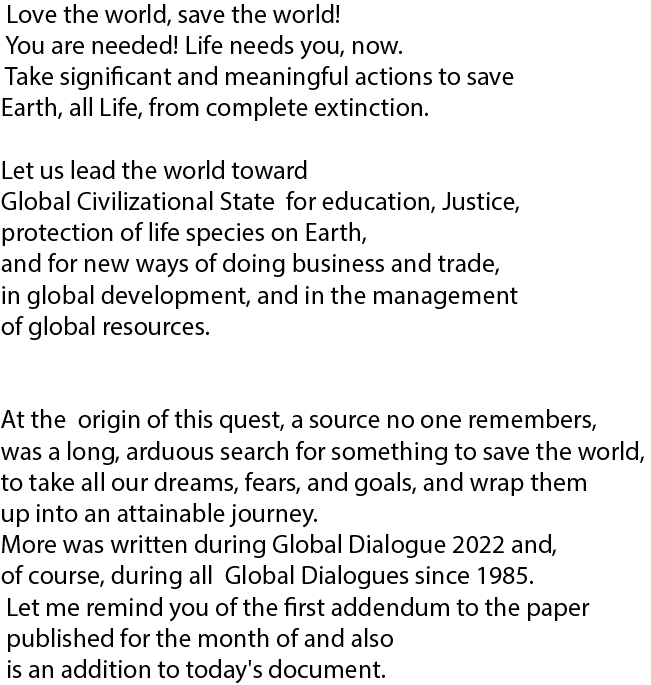
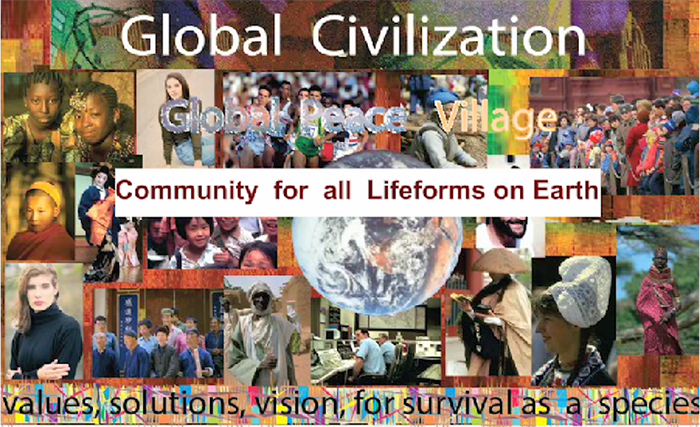

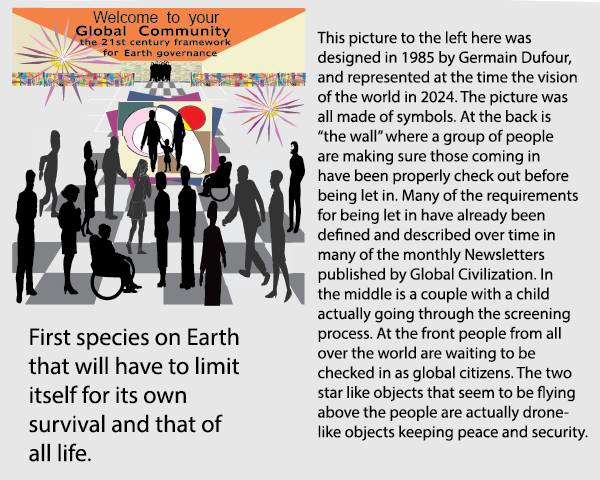
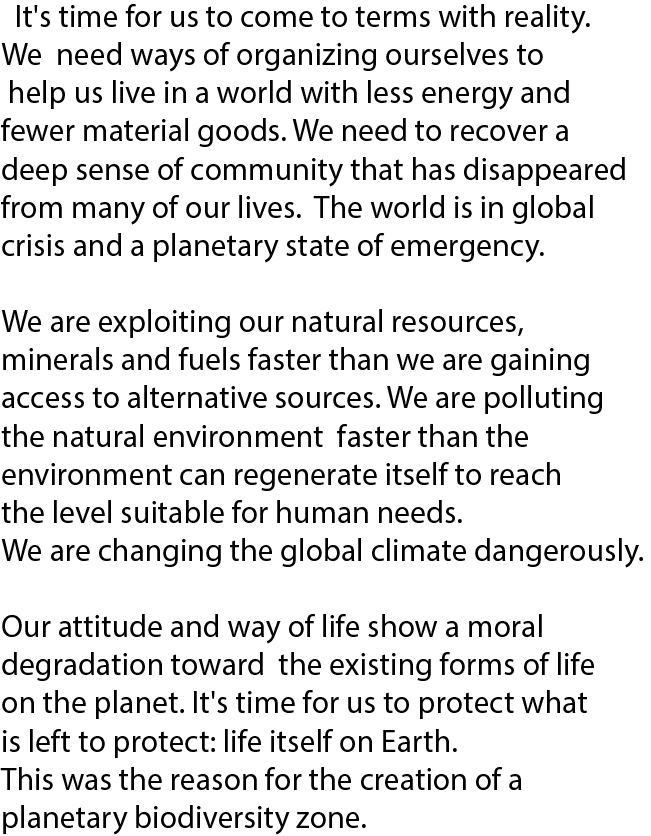
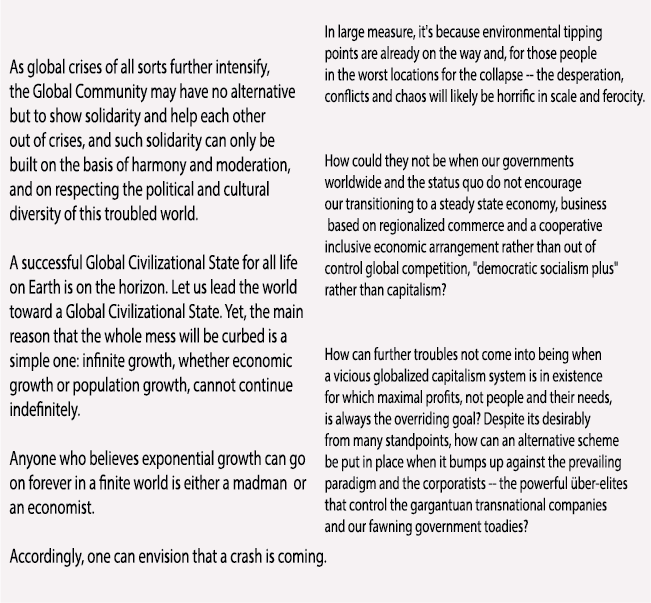
A civilization is a complex human society, usually made up of different cities, with certain characteristics of cultural and technological development. In many parts of the world, early civilizations formed when people began coming together in urban settlements.
A civilization can also be defined as a complex culture with five significant characteristics: advanced cities, specialized workers, complex institutions, record keeping, and advanced technology. Advanced cities are an important feature of civilized life. Cities were actually the birthplaces of the first civilizations.
All civilizations have certain characteristics. These include: large population centers; monumental architecture and unique art styles; shared communication strategies; systems for administering territories; a complex division of labor; and the division of people into social and economic classes.

All world civilizations have values, solutions to handle issues, and a vision for survival as a species.
The UN Security Council seeks to address threats to international security. Its five permanent members, chosen in the wake of World War II, have veto power. The Security Council fosters negotiations, imposes sanctions, and authorizes the use of force, including the deployment of peacekeeping missions. Global Community and its Global Protection Agency will be asked to replace the UN to help our overpopulated world managed our ways relating to the production, buying, and selling of goods or services.
The UN has no military forces of its own, and Member States provide, on a voluntary basis, the military and police personnel required for each peacekeeping operation.
The United Nations is an international organization founded in 1945 and committed to maintaining international peace and security; developing friendly relations among nations; promoting social progress, better living standards and human rights.

A civilization is a complex human society, usually made up of different cities, with certain characteristics of cultural and technological development. In many parts of the world, early civilizations formed when people began coming together in urban settlements.Knowing about how ancient people and societies dealt with issues in the past helps us to recognize, and be prepared for, dealing with our own issues both currently and in the future.
The most important characteristic for the development of a civilization is the presence of advanced cities because they were centers of trade, which established economies and allowed for further development of the civilizations.
The most important characteristic for the development of a Global Civilizational Community, or Multicivilizational Community, is the presence of advanced cities because they were centers of international trade, which established world economies and allowed for further development of the global civilizations, and established Global Peace and the Protection of the Global Life Support-systems.
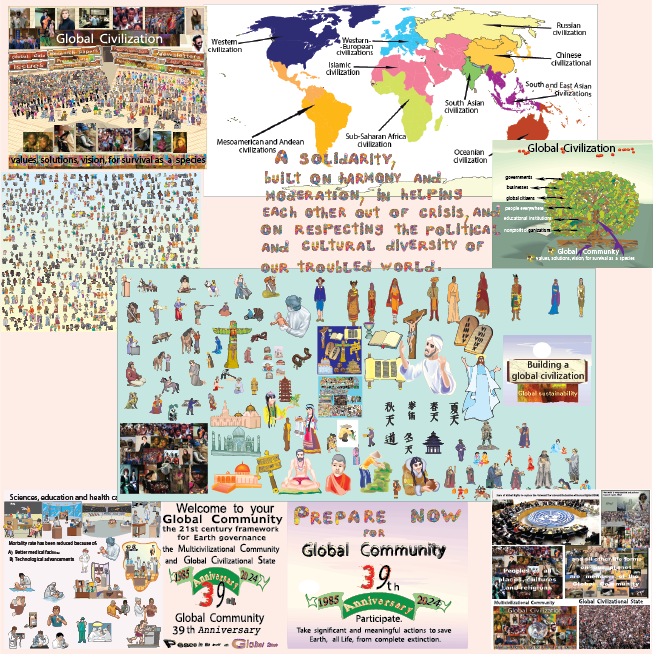
We welcome new participants and authors.
Free registration. No fees. All for humanity and life on Earth.
Check our volunteer page at: http://globalcommunitywebnet.com/GPA/gpahelpsyou.htm
We, global citizens, do volunteer work for humanity. We expect volunteers to be responsible and accountable of all their actions. In order to create a harmonious and compassionate Global Civilizational State, we want you to become a volunteer.




And we need a complete turn around of our ways of doing business and trade, in global development, and in the management of global resources. Global Civilizational State has included morality and ethics into our ways of doing business and trade, and into consumer understanding and use of each product on the market. Furthermore and most importantly, we must replace the United Nations by Global Parliament with the immediate action to form the Global Trade and Resources Ministry as promoted by Global Civilizational State, a more meaningful union in the form of nine or more Global Governments. A Global Government is concerned not only with economics and trade, but also with the environment, social, cultural and many other essential services. The Federation of Global Governments is the place of meeting between them.
We welcome new participants and authors. Free registration. No fees. All for humanity and life on Earth. Check Global Community volunteers site.
Executive order concerning Global Parliament, all of Humanity's new vision of the world.
Vision of the world to save all life on our planet, Earth.
Executive order concerning Global Parliament, all of Humanity's new vision of the world.
Humanity's new vision of the world.
by
Germain Joseph Dufour.
I am
President of Global Parliament
Global Civilizational Community
Multicivilizational Community
Global Community
and also President
of my own Canadian business for global trade, and website:
Global Community WebNet Ltd.
globalcommunitywebnet.com
And welcome to all of you Global Citizens.
Global Civilizational State dependable and trustworthy leadership to guard over and care for all Life on Earth.
- a) Global Civilizational State and America modernizing the world.
- b) Commonalities between Asia and the West engendered and self-disciplined global citizens to prepare them for life survival now and long after Earth has ceased to exist.
- c) Global crises and existential threat to humanity, all life on Earth.
- d) Description of modern day civilization-states.
- e) Past and modern civilization-states on our planet and government.
- f) Global crises need a sound Global Civilizational State leadership.
- g) How and why capitalism has been a failure of our democratic system of governance.
- h) Democratic socialism plus.
- i) Morality and ways of doing business within Global Civilizational State.
- j) Earth governance and Global Ministries.
- k) Global consumption and sustainability.
- l) Earth environmental governance can only be achieved successfully within the larger context of sustainable development and Earth management.
- m) Global Civilizational State strongly opposes environmental, economic, population, and military warfares.
Global Civilization, the 21st century vision of Global Community.
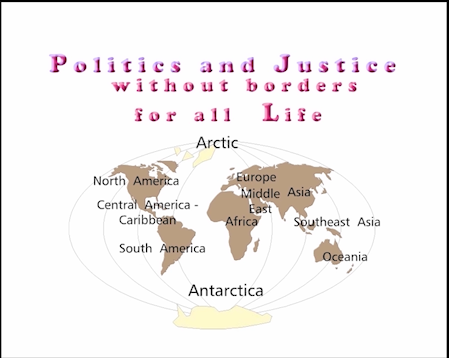
Global Civilizational State: our future generations may be contrasted with current and past generations, and evoked in order to encourage thinking about intergenerational equity. The recognition of rights of future generations is the right to achieve a sustainable level of development and the right to be able to utilise natural resources. The Scale of Global Rights does answer this thinking.










Global governance and management.

Global Parliament.






Follow the Proceedings sections, and you will find the actual author lists, with their papers and all references. Global Community Media is a way to communicate workable sound solutions to problems arising in the world. Let us share our problems and workable sound solutions. Sharing information is a necessity to all life and humanity's survival. Our world is changing fast before our eyes, and we must react quickly and hard to protect all life on Earth. No hesitation! Right now and no waiting! Life on the planet is our first priority. We must protect it at all costs.
GC_71
We, global citizens, fight to protect Life on Earth for this generation and the next ones. We are the defenders of the environment and the global life-support systems. We know who the beasts are, and how they destroy the living on our planet. We have rallied together all over the world to protect our home, Earth. Just so you all know we don't pay anyone, and we don't pay expenses. We do volunteer work for humanity. We expect volunteers to be responsible and accountable of all their actions. We do soft activism work. We do not have a copyright research expert to do this work. In order to create a harmonious and compassionate Global Civilizational State , and to protect our planetary environment, the global life-support systems, we want to help you concerning all issues, and you may become a volunteer yourself.Check our volunteer page at: http://globalcommunitywebnet.com/GPA/gpahelpsyou.htm
GC_72
Human history stretches through generations, and is the history of civilizations. Civilization and culture both refer to the overall way of life of a people, and involve the values, beliefs, norms, institutions, social structures, and modes of thinking to which successive generations in a given society. The composition and shapes of civilizations change over time, the cultures of peoples interact and overlap. A short list of values humans have developed over time to survive as a species are shown here.

GC_73
If the term civilization is elevated to what is common to humanity as a whole then the largest cultural groupings of people would be a single Global Civilizational State, that is a variety of cultures, of peoples, of religious worlds, of historical traditions, and of historically formed attitudes.People have shared a few fundamental values and institutions throughout history, which may explain some constants in human behavior but it cannot explain history, which consists of changes in human behavior.
The development and evolution of the West are in large part the factors which enabled the West to take the lead in modernizing itself and non-Western societies. These factors were truly concepts, practices, and institutions have been more prevalent in the West than in non-Western civilizations. Over time, characteristics of Western civilization have been defined by religion and moral principles, human rights, language, ancestry, history, ethnic groups, customs and laws, and also by maintaining a meaningful independent existence, and ways of life.
GC_74
America is the distinct core-state civilization of the West. Inevitably, the fate of the United States within the West grouping of states depends upon Americans asserting strongly once more their commitment to Western civilization and today, their commitment to the Global Civilizational State which is seen by global citizens as the guardian, custodian and embodiment of Western civilization.The effect of the expansion of the West has promoted both the modernization and the Westernization of non-Western societies. However modernization does not necessarily mean Westernization. Non-Western societies can modernize and have modernized without abandoning their own cultures and adopting wholesale Western values, institutions, and practices. In short, modernization has meant a great victory and achievement of Global Civilizational State on Earth.
Now, let us have a more specific definition and understanding of non-Western civilizations. Non-Western societies, such as those in East Asia, are expanding their economic wealth, political strength, military power, claiming their own cultural values and letting go those constrained on them by the West. Nations with cultural similarities cooperate economically and politically. For instance, East Asian economic success has its primary source in East Asian culture. Power has shifted from the predominant West to non-Western civilizations, and global politics has become multipolar and multicivilizational.
For China, unity is its first priority. The Chinese state enjoys a very different kind of relationship with society compared with the Western state. It enjoys much greater natural authority, legitimacy and respect, even though not a single vote is cast for the government. The reason is that the state is seen by the Chinese people as the guardian, custodian and embodiment of their civilization. The duty of the state is to protect its unity. The legitimacy of the state therefore lies deep in Chinese history. This is utterly different from how the state is seen by Western societies.
GC_75
Within China development model, the main features of the civilizational state (population, territory, tradition and culture) all constitute China's greatest strengths. China has the richest human resources and potentially the largest consumer market; China has an unparalleled geopolitical and geoeconomic status; China has its tradition of independent thinking, and has the richest cultural resources in the world. China is a civilizational state generating its own standards and values and making unique contributions to the world civilizations. China's civilizational state has a strong capability to draw on the strengths of other nations while maintaining its own identity. The Chinese people have a deep respect of Nature and have applied the secular application of ethics and political philosophy to social, economic, and political governance. Chinese culture is more inclusive than exclusive, within the broad conceptual framework of the Confucian idea of 'unity in diversity". The greatest wisdom of a civilizational state is its long tradition of seeking common ground while differences are set apart, and this wisdom is first reflected in the Chinese language.Over ancient time to this day, morality in society made its way into our ways of doing business. So the set of behaviors that constitute Global Civilizational State ethic for a business also evolved largely because they provided possible survival benefits to increase evolutionary success. Consequently, peoples evolved socially to express emotions, such as feelings of empathy or guilt, in response to these moral behaviors. Humans developed truly moral, altruistic instincts.
GC_76
When looking across cultures of geo-cultural areas and across millennia, certain virtues have prevailed in all cultures, the major ones include:wisdom, knowledge, courage, justice, love, truth, empathy, kindness, and social intelligence.These virtues were not always incorporated into the ways of doing business because the 1% super rich businesses became corrupted, greedy, no longer in line with humanity's survival on the planet, and more interested in keeping most of the wealth, resources and power for themselves keeping the remaining 99% of the world population in poverty. But today, Global Civilizational State incorporates these virtues and proper behaviors into corporate citizen global ethics.
GC_77
Global Civilizational State ethics for a business are about how we treat others and a commitment to respect every person humanely and with dignity. For this process to work, global citizens learn to forgive, be patient and compassionate, promote acceptance, open theirs hearts to one another, and practice a culture of solidarity and cooperation. Let go narrow differences between us all for the greater good of humanity and future generations.Economic and political power must be used as a service to humanity instead of misusing it in ruthless battles for domination. Global Community faith can help to develop a spirit of compassion with those who suffer, with special care for the children, the aged, the poor, the disabled, and the refugees.
We need ways of organizing ourselves to help us live in a world with less energy and to grow strong caring communities in which we get more of our human satisfaction from caring relationships and less from material goods. We need to reclaim the ideal of being a democratic middle-class people without extremes of wealth and poverty. We need to recover a deep sense of community that has disappeared from many of our lives. This means letting go a sense of ourselves as consumption machines. We need a Global Civilizational State leadership for all of humanity. We all could learn from the successful ways of China, the chinese leadership governing his or her people. The daily problems they have to overcome issues with a population higher than 1.5 billion people, all with different ways of doing things, cultural and religious included.
GC_78
The increased interaction among peoples which includes trade, investment, tourism, media, electronic communication, is generating a common world culture. Improvements in transportation and communications technology have indeed made it easier and cheaper to move money, goods, people, knowledge, ideas, and images around the world. By increasing trade globally is unlikely to ease international tensions or promote greater international stability. Economic interdependence fosters peace only when states expect that high trade levels will continue into the foreseeable future, otherwise war is likely to result.Today the evidence-based argument for the appearance of a Global Civilizational State is really the result of the broad processes of modernization that have been going on since the eighteenth century. Modernization involves industrialization, urbanization, increasing levels of literacy, education, wealth, social mobilization, and more complex and diversified occupational structures. It is a product of the tremendous expansion of scientific and engineering knowledge beginning in the eighteenth century that made it possible for humans to control and shape their environment in totally unprecedented ways. Modernization is a revolutionary process comparable only to the shift from primitive to civilized societies that is, the appearance and evolution of Global Civilizational State.
GC_79
In consequence of globalization, the new economic and political distribution of power around the world has become very different then we were used to. It has become very fluid, in perpetual motion and affected by global markets. Giant new markets are forming all over the world. Competition is hardening. National economies can no longer insure or guarantee rights of possession on any property. National borders no longer mean protection, security, cultural boundaries, resources ownership, political and economic control.Environmental problems have contributed to numerous collapses of civilizations in the past. Now, for the first time, a global collapse appears likely and global warming, overpopulation, overconsumption by the rich and poor choices of technologies are major drivers; dramatic cultural change provides the main hope of averting calamity.
GC_80
Today, for life survival on our planet, a distinction must be made in the developed countries between necessary and limitless consumption, between socially beneficial and non-beneficial uses of property, between justified and unjustified uses of natural resources, and between a profit-only and a socially beneficial and ecologically oriented market economy. The lives of all lifeforms and plants on our planet deserve protection, preservation, and care. Global Community disapproves of the limitless exploitation of the natural foundations of life, the relentless destruction of the biosphere, and the militarization of the space within and above the Earth's atmosphere. Global citizens must live in harmony with nature on and above the Earth's surface.The life extinction crisis on Earth is an environmental issue and also a social justice issue, one that is linked to long histories of capitalist domination over people, other life forms, and plants. The extinction crisis needs to be seen as a key element in contemporary struggles against accumulation by dispossession. This crisis, in other words, ought to be a key issue in the fight for climate justice. The 1% people have as much wealth as half the world's population, and are controlling all economies on the planet. They stand behind an economic system based on capitalism that has institutionalized a global ignorance, in which producers and consumers cannot know or care about one another, and in which the histories of all products will be lost.
It is now increasingly evident that only by sharing the world's natural resources more equitably and sustainably will we be able to address both the ecological and social crisis we face as Global Civilizational State.
The combined effects of aggressive marketing, advertising, and planned product obsolescence mean that the American consumer’s oversized footprint is largely a consequence and reflection of the global power of Transnational Corporations(TNCs), and more specifically corporate America. Global warming and climate change denialism requires shutting one’s eyes to obvious realities when the truth is that the Earth is warmer than it has been in 120,000 years. In that sense, it is perhaps more accurate to speak of corporate ecological footprints rather than the footprints of nations or individuals. Globalization has meant the distancing of cause and effect, source and sink, so that the pollution and human exploitation caused in the production and transport of goods has remained invisible and opaque to consumers.
How can further troubles not come into being when a vicious globalized capitalism system is in existence for which maximal profits, not people and their needs, is always the overriding goal? The global socioeconomic system of capitalism is forcing us to work harder to surpass previous consumption and population numbers until we have devoured everything that maintains life, ending up with a polluted, lifeless, and scorched planet.
Although the yearning for peace is deep-seated, it has never been achieved during civilisation due to its competitive nature. If we keep capitalism, the ultimate in competitiveness, it will finish us. Peace can’t be attained with military force; one can’t fight for peace or for cooperation. Peace is now possible because we have to have it to survive. People have the intellectual and the emotional ability to work out the multitude of changes to enable us to be fully social and survive, if it’s our goal.
In a multicivilizational world, there are core values which different ethnic and religious societies have in common. The constructive course is to renounce global culture, accept diversity, and seek commonalities. Commonalities exist between Asia and the West. Whatever the degree to which humankind is divided, the world's major religions, Western Christianity, Orthodoxy, Hinduism, Buddhism, Islam, Confucianism, Taoism, Judaism, also share key values in common. A more inclusive Global Civilizational State can emerge gradually through the exploration and expansion of these commonalities. Peace in a multicivilizational world is the finding of those commonalities and so peoples in all civilizations should search for and attempt to expand the values, institutions, and practices they have in common with peoples of other civilizations.
GC_81
What would be the shape and fundamental goals of an expansive anti-capitalist movement against extinction and for Environmental Justice? It would have to commence with open recognition by the developed nations of the long history of ecocide.Such an admission would lead to a consequent recognition of the biodiversity debt owed by the wealthy nations of the global North to the South. Building on the demands articulated by the climate justice movement, the anti-capitalist conservation movement must demand the repayment of this biodiversity debt. When we study the human behaviour, specially the people of the European Union, and people living closely to the EU, three fundamental types of behaviour can be distinguished: the purely practical, the theoretical-practical, and the purely theoretical.These three types of behaviour have three different reasons: the first a determining reason, the second a motivating reason, and the third a supporting reason. Over the past decades and centuries, they have behaved as if the world belongs to them, and were borned to lead the world. They fought one another and/or got together to show they were are not afraid to be the one who wins a country in a war, subdues or subjugates a people, or overcomes an adversary. They have been constantly at war. And even Adolf Hitler has showed the perfect behaviour and had no respect for diplomacy. He had no respect to keep good relations between the governments of different countries. He had no skill in dealing with others and governments without causing conflicts and wars.
One of the most important – but often forgotten – elements of customer experience is that it’s all about human beings. Customers are human beings, employees are human beings, and executives are human beings. So to improve customer experience, you need to first understand and embrace how people actually think and behave.
GC_82
As Moscow's war in Ukraine rages on, with deadly shelling on cities along the front lines and more clashes in hot spots in southern Ukraine, the Ukrainian president, Volodymyr Zelenskiy, showed no need to use diplomacy to save his country from being detroyed and his citizens from being killed. NATO and the USA, along with the EU, are expected to help as if wars was the way to solve problems. This is the kind of behaviour these people from the EU have been using between themselves over the past centuries. War is the answer to their problems.When intelligent peoples study global problems, the best solutions to problems are not the destruction of the environment. Climate change has caused increased heat, drought, and insect outbreaks. In turn, these changes have made wildfires more numerous and severe. The warming climate has also caused a decline in water supplies, reduced agricultural yields, and triggered heat-related health impacts in cities.
Intriguingly, piranhas bark or grunt when they feel defensive and are afraid of humans like other small fish. Although these sea creatures rarely attack humans, they become more aggressive and bite when food is scarce, and waters are low in dry seasons. They will attack humans. And that is what the people from the EU nations are doing.
GC_83
By the conventional definition, there are 44 sovereign states or nations in Europe. Not included are several countries namely Turkey, which occupies only a small part of East Thrace on the European Balkan Peninsula. Over the past centuries, all of the European nations have been fighting each other or fighting with each other. Diplomacy was never a part of their DNA. They would rather behave like Piranhas. They get together to either fight one another or fight foreigners. Again like Piranhas do.A legally imposed contraction of the fossil energy supply and a rapid global conversion to renewable energy is a necessary step toward saving our world, Earth. So what should society do to avoid the worst impacts of climate change? Capitalism is based on ceaseless compound growth that is destroying ecosystems the world over, the goal in the rich nations of the global North must be to overturn our present expansionary system by fostering de-growth. Most importantly, nations that have benefited from burning fossil fuels must radically cut their carbon emissions in order to stem the lurch towards runaway climate chaos that endangers the vast majority of current terrestrial forms of life.
The main source of economic reliability in America was transferred over time from gold to dollars, specifically to US treasury bills. This major shift allowed the Federal Reserve to print dollars practically without limit (as seen in recent years with interests rates for borrowing money from the FED at around 0%), well aware that the demand for dollars would never cease, this also keeping alive huge sectors of private and public enterprises such as the coal industry, fracking industry, car manufacturing, food and farming industries, and most importantly the military industry which has always giving jobs to more than half of America's population. No wonder President Trump, and several USA Presidents before him, have been claiming the lowest unemployment rate because more than half of America population works for the war industry, the industry that has produced most of the greenhouse gases globally at the expenses of the global life-support systems. This set a course for a global economic system based on financial instruments like derivatives and other securities instead of real, tangible goods like gold. In doing this for its own benefit, the US has created the conditions for a new financial bubble that could bring down the entire world economy when it bursts.
GC_84
The primary goal of the developed nations must be to overturn the present expansionary economic system based on capitalism by fostering de-growth and creating steady state societies founded on principles of equality and environmental justice.Most importantly, nations that have benefited from burning fossil fuels must radically cut their carbon emissions in order to stop the climate chaos that endangers the vast majority of current terrestrial forms of life.
Let us now define what economic system should be used to govern our planet. What would be best is a "democratic socialism plus". The "plus" means added essential elements for governing sustainably. For instance, people would have free health care, free education at all levels, and employment for everyone. People would control and manage natural resources at all stages: exploration, production, transportation, manufacturing and distribution. A Global Trade and Resource Ministry would be formed to look after the management of naturel resources worlwide.
GC_85
"Democratic socialism plus" advocates that the control and management of natural resources be under the control of the people. The 1 % super rich people worldwide who thrive within capitalism, must be overthrown. This new way of governing can be achieve through legitimate democratic means by voting in a party that represents this way of governing. "Democratic socialism plus" implies public owership, not private ownership of natural resources.Because of the limited quantities of Earth resources to be made available for this generation and the next ones, and because of environmental, climate change, and world population concerns, there is a need to manage the entire process of using Earth natural resources. And we all know that the amount of oil left in the ground in the world has already passed its peak quantity. So why waste the oil on doing things we know are nothing but a waste of energy and often used for destruction and certainly will shorten the life span of the next generations. A Global Trade and Resources Ministry is needed to look after the management of Earth resources and trade at all stages: exploration, production, transportation, manufacturing and distribution.
GC_86
The quality of Earth governance is reflected in each local community worldwide. Global Community will show leadership by creating a global civil ethic within our ways of life. Global Constitution describes all values needed for good global governance: mutual respect, tolerance, respect for life, justice for all everywhere, integrity, and caring. The Scale of global Rights has become an inner truth and the benchmark of the millennium in how everyone sees all those values.Earth environmental governance can only be achieved successfully within the larger context of sustainable developent and Earth management. All aspects are inter-related and affect one another. A healthy environment is essential to long term prosperity and well-being of Global Community citizens. That demands a high level of ecological protection. This is the 'raison d'etre' of the Scale of Global Rights. Ecological and primordial human rights of this generation and of future generations are therefore much more important than any other human rights existing now and in the future.
In this way the Scale of Global Rights gives us a sense of direction for future planning and managing of the Earth. Earth management is now well defined and becomes a goal to achieve. We no longer waste energy and resources in things that are absolutely unimportant. It has also become a necessity of establishing the Global Trade and Resources Ministry that will be assessing, compiling, managing and protecting Earth resources, and the Earth Court of Justice prosecuting cases involving crimes related to the relentless misused of the Earth resources.
GC_87
It's time for us to come to terms with reality. We need ways of organizing ourselves to help us live in a world with less energy and fewer material goods. We need to recover a deep sense of community that has disappeared from many of our lives. The world is in global crisis and a planetary state of emergency. We are exploiting our natural resources, minerals and fuels faster than we are gaining access to alternative sources. We are polluting the natural environment faster than the environment can regenerate itself to reach the level suitable for human needs. We are changing the global climate dangerously. Our attitude and way of life show a moral degradation toward the existing forms of life on the planet. It's time for us to protect what is left to protect: life itself on Earth. This was the reason for the creation of a planetary biodiversity zone.Global Civilizational State has shown the benefits of biodiversity to humanity and hope this approach will motivate others to help create the zone.
The stewardship of the ecological base has to be given priority before the fulfilment of various economic and social wishes. All families need shelter, food, language, body of knowledge, certain skills, a source of income. Security of the home is an important aspect for any family and Global Civilizational State it belongs to. Primordial human needs raise the question of interacting universal responsibilities. In terms of parenthood, parents must raised their children mentally and physically healthy. It is a responsibility to do so. Which also means each local community must have an educational system to help parents raise the child. On the Scale of Global Rights primordial human rights and the protection of the global life-support systems and of ecological rights are on top of the Scale. They are the most important aspects on the Scale.
As global crises of all sorts further intensify, the Global Community may have no alternative but to show solidarity and help each other out of crises, and such solidarity can only be built on the basis of harmony and moderation, and on respecting the political and cultural diversity of this troubled world. A successful Global Civilizational State for all life on Earth is on the horizon. Let us lead the world toward a Global Civilizational State.
Yet, the main reason that the whole mess will be curbed is a simple one: infinite growth, whether economic growth or population growth, cannot continue indefinitely. Anyone who believes exponential growth can go on forever in a finite world is either a madman or an economist. Accordingly, one can envision that a crash is coming. In large measure, it's because environmental tipping points are already on the way and, for those people in the worst locations for the collapse -- the desperation, conflicts and chaos will likely be horrific in scale and ferocity.
How could they not be when our governments worldwide and the status quo do not encourage our transitioning to a steady state economy, business based on regionalized commerce and a cooperative inclusive economic arrangement rather than out of control global competition, "democratic socialism plus" rather than capitalism? How can further troubles not come into being when a vicious globalized capitalism system is in existence for which maximal profits, not people and their needs, is always the overriding goal? Despite its desirably from many standpoints, how can an alternative scheme be put in place when it bumps up against the prevailing paradigm and the corporatists -- the powerful über-elites that control the gargantuan transnational companies and our fawning government toadies?
GC_88
Earth has long been waiting for a truly global governing body based on universal values, global rights, global concepts and democracy. We might as well start this new way of doing things creating process now, there is no longer any reason to wait. But then Global Civilizational State is already here. As never before in history, common destiny beckons us to seek a new beginning. It requires a new sense of global interdependence and universal responsibility. We must develop and apply the vision of a sustainable way of life locally, nationally, regionally, globally, and within ourselves throughout life. Our cultural diversity is a precious heritage and different cultures will find their own distinctive ways to realize the vision.Global Civilizational State has now a Vision of the Earth in Year 2024 and a sense of direction. Global Civilizational State embarks on a new path in history, the inevitability of global societies living, sharing, and creating symbiotical relationships interactively is, beyond doubt, that which we must confront. Our creativity today may influence tomorrow's socio-economic strategies and contribute to the evolution of human societies - an evolution directed towards a global partnership and cooperation with each other for survival.
In order to build a sustainable global community, each individual, each local community, and national governments of the world must initiate their commitment to Global Civilizational State. Global Civilizational State was defined as a social, and political movement in the sense of having a broad organizational structure and an ideology aimed at governing. The environmental movement, within Global Civilizational State, expresses the concerns of groups of people regarding depletion of water, clean air, climate change aspects, degradation of land and other changes in ecosystems affecting traditional patterns of natural resources exploitation . Global Civilizational State has taken the role of helping these groups in protecting and managing the environment by coordinating their efforts.
Global Civilizational State opposes environmental, economic, population and military warfares. Global Civilizational State was first to oppose any type of invasion of a people by another people. An invasion is either an environmental, economic, population or military offensive in which large numbers of combatants of one geopolitical entity aggressively enter territory owned by another such entity, generally with the objective of either conquering; liberating or re-establishing control or authority over a territory; forcing the partition of a country; altering the established government or gaining concessions from said government; or a combination thereof.
An invasion can be the cause of a war, be a part of a larger strategy to end a war, or it can constitute an entire war in itself. Due to the large scale of the operations associated with invasions, they are usually strategic in planning and execution. Global Civilizational State has been witnessing such different types of walfares for decades. And now is time to stop all types of invasion no matter what they maybe.
Overpopulation worlwide is a crisis. Everyone is responsible and are required now by Global Civilizational State to follow Global Law as defined and developed by Global Community.
Global Community Ministry of World Population.

Ministry of Global Peace in government.
Moratorium on world population and the fertility rate, and ending population warfare.

Clearly the environmental challenges facing humanity in this century and beyond would be less difficult in a world with slower population growth or none at all.
Proceedings of Global Dialogue 2024
Ministry of Global Peace in government
Over the past decades we have shown that peace in the world and the survival and protection of all life on our planet go hand in hand. Asking for peace in the world means doing whatever is necessary to protect life on our planet. Protecting life implies bringing about the event of peace in the world. Let our time be a time remembered for a new respect for life, our determination to achieve sustainability, and our need for global justice and peace.
GC_89
Our Global Peace Mouvement is about the courage to live a life in a harmonious peace order and showing by example, thus preventing poverty, wars, terror and violence. We need to educate the coming generations with good principles, being compassionate, social harmony and global sustainability being some of them.Soul of all Life said in Global Peace Earth "Soul of all Life teaching about Peace: Introduction"
Global Community vision creates new hopes, standards, ideals and goals for everyone to embrace freely, and live a life without fear. Global Community faith is about realizing this new global order will be better, safer, and more realistic after replacing the 1948 Universal Declaration of Human Rights by Scale of Global Rights.
In the context of the global civilization of the 3rd Millennium, we have defined that any symbiotical relationship is for the good of all, for the good of the 'other'. It is based on a genuine group concern and unconditional support for the individual's well-being ~ a giant leap in human behaviour.The question is how can we improve the political symbiotical relationship to fulfill the fundamental criteria? Global Community promotes the values and principles to achieve the fundamental criteria and that requires the promoting and establishment of: global community ethics, mutual respect, respect for life, basic liberties, justice and equity, caring for the 'other', integrity, responsibility and accountability.
Other symbiotical relationships may be based on common concerns and issues such as: the environment, peace, justice, women's rights, human and Earth rights, and many more. There is a whole spectrum of possible symbiotical relationships.
Symbiotical relationships are needed today for the long term future of humanity and for the protection of life on Earth.
Certainly it is better to seek an economic relationship with another nation we can trust than with a hundred nations we have no control on and everyone of those nations has a say in the governing of our nation, its environment and social structure.
The best way and solution for any nation is to follow the Scale of Global Rights. Right on top of the scale are the ecological rights, the global life-support systems, and the primordial human rights of this generation and of the next generations.
GC_90
Global Community is inviting you to participate in the formation of global symbiotical relationships between people, institutions, cities, provinces,communities, nations, and businesses.
Global Community is inviting you to participate in the formation of global symbiotical relationships between people, institutions, cities, provinces,communities, nations, and businesses. We are alsoproposing the formation of a political symbiotical relationship between state and global civil society. A similar relationship alreadyexists between the people of Global Community, also known as the human family, the global civil society.
Global Community ethics offer fundamental moral behaviors and irrevocable standards. You need not be religious to make this vision yours. This vision is for all human beings regardless of their social origin, language, culture, sex, skin color or religion. Global Community vision creates new hopes, standards, ideals and goals for everyone to embrace freely, and live a life without fear. Global Community faith is about realizing this new global order will be better, safer, and more realistic after replacing the 1948 Universal Declaration of Human Rightsby Scale of Global Rights
.
To determine rights requires an understanding of needs and reponsibilities and their importance. The Scale shows social values in order of importance and so will help us understand clearly the rights of a community and its citizens. So now Global Community ethics includes a process based on Scale of Global Rights. Global citizens have a binding responsibility for the welfare of all humanity and care for all life on Earth. Global Community ethical grounds are practical, real, and applicable for all women and men of good will, religious and non-religious.
Scale of Global Rights definition
Definition of the Scale of Global Rights




On the Scale of Global Rights primordial human rights and the protection of the global life-support systems (ecological rights) are on top of the Scale. They are the most important aspects on the Scale. For instance, the existing and future uses of water are constantly challenged; balancing supply and demand is made even harder by the amounts of pollution found in the air, land and waters. A large part of our body is made of water, and we cannot live without water; therefore water is a primordial human right by our very nature.
Primordial human rights are those human rights that individuals have by virtue of their very existence as human beings: to live, eat, drink fresh water, breath clean air, and have shelter. These rights are separate categories than ecological rights, the right of the greatest number of people, economic rights, social rights, cultural rights and religious rights.
Ecological and primordial human rights are the only rights that have existed unchanged throughout the evolutionary origin of our species. Any major change would have threatened our very existence. All other human rights are rights created by human beings and can be changed depending of new circumstances; they are not stagnant but are rather flexible and adaptive, and they can evolve. Ecological and primordial human rights of this generation and of future generations are therefore much more important than any other human rights existing now and in the future.
In this way the Scale of Global Rights gives us a sense of direction for future planning and managing of the Earth. Earth management is now well defined and becomes a goal to achieve. We no longer waste energy and resources in doing things that are absolutely unimportant. So it has become a necessity to establish the Ministry of Global Resources that will be assessing, compiling, managing, protecting and distributing Earth resources, and the Earth Court of Justice prosecuting cases involving crimes related to the relentless misused of the Earth resources.
In order to avoid conflicts and wars over drinking (fresh)water, fresh water has been categorized as a primordial human right. Industrial pollution plays a major role in the deterioration of nature but this time the level of pollution is above the carrying capacity of a healthy ecosystem. Pollution also affects significantly human health and all lifeforms on Earth. Every person needs Oxygen to live so clean air is certainly also a primordial human right by our very nature.
Control over the amounts of greengases produced by human activities and let go into our air must be paramount to governance and management of Earth.The production of greengases involves the destruction of the Oxygen in our air and its replacement by CO2, a deadly chemical. CO2 concentrations in the atmosphere have been measured at an altitude of about 4,000 meters on the peak of Mauna Loa mountain in Hawaii since 1958. The measurements at this location, remote from local sources of pollution, have clearly shown that atmospheric concentrations of CO2 are increasing. The mean concentration of approximately 316 parts per million by volume (ppmv) in 1958 rose to approximately 369 ppmv in 1998. The annual variation is due to CO2 uptake by growing plants. The uptake is highest in the northern hemisphere springtime.
Today in 2022, the concentration is more than 460 ppmv. And after all the dirty tars sands oil of Alberta has been consumed, the concentration will be over 600 ppmv, i.e. the end of civilization as we know it, and the end of most lifeforms on the planet.
Human beings have a moral obligation to protect and conserve the biodiversity of life on Earth. The Global Constitution shows us how it can be done with Global Law, the Earth Court of Justice, and how the Global Protection Agency (GPA) and the Agency of Global Police (AGP) can protect the territory. Global Community Arrest Warrants can be issued to anyone breaking Global Law.
Leaders of the wealthier nations must be willing to accept responsibility for past mistakes and to help pay the financial burden for environmental protection of the developing nations. This is the most damaging conflict of interests between the rich industrialized countries and those that are poor and struggling just for existence. Global Community must help wealthy and poorer nations reach a better understanding of each other's needs.
All aspects are interrelated: peace, human rights and the environment. The poor is more concerned with ending starvation, finding a proper shelter and employment, and helping their children to survive. Environmental issues become meaningless to the poor. In reality, all concerns are interrelated. As soon as the environment is destroyed beyond repair, human suffering is next. Ecology has no boundaries. All nations suffer the effects ofair pollution, global warming, loss of biodiversity, soil erosion, acid rain, ozone depletion, silting of streams, and countless of other environmental problems. This was the reason for proposing to Global Community the Scale of Global Rights.
Global Community ethics offer fundamental moral behaviors and irrevocable standards.You need not be religious to make this vision yours. This vision is for all human beings regardless of their social origin, language, culture, sex, skin color or religion.Global Community vision creates new hopes, standards, ideals and goals for everyone to embrace freely, and live a life without fear.
Actions for the good of all as per the Statement of Rights, Responsibilities, and Accountabilities.
The political system of an individual country does not have to be a democracy.

Global Community must now direct the wealth of the world towards the building of local-to-global economic democracies in order to meet the needs for food, shelter, universal healthcare, education, and employment for all.
Global Economic Model proposed by Global Community is truly the best response to the world.
Direct democracy and global voting on issues
Creation of a biodiversity zone protection all around the planet by way of Earth rights and taxation of natural resources
There are a large body of work of articles, papers and reports concerning the need to protect our environment and Global life-support systems. We are showing here a few.
It is the same idea for any consumer product. You manufacture, produce, farm or createa product, you become responsible and accountable of your product from beginning to end (to the point where it actually becomes a waste; you are also responsible forthe proper disposable of the waste).
People in our society often argue that their manufacturing products and the trading principles or rules that regulate their actions are all legal! But what about ethical values and moral principles?!
Climate change is definitely at the top of the most global important issues facing our planet today. While this issue primarily focuses on global warming, changes in precipitation, air quality, biodiversity, “habitable” zones and many other areas are part of and affected by climate change. However, it is extreme global climate change that would result in epic disruption if not outright decimation of the human species and most life as we know it today. We have already seen the death and destruction wreaked by monster typhoons and hurricanes, unexpected volcanic activity, monsoons, extreme heat and extreme cold systems.
History has demonstrated for over three billion years that life can adapt and new species can and will evolve, including humans. Humans are highly adaptable, and they are roaming and nomadic. The same goes for many lifeforms – fauna and flora — which we have seen migrate as weather conditions and trends change. There are other earth-threatening phenomena that pose far greater challenges to humanity than global climate change.
With Earth’s hottest temperatures normally hovering at 115°F (46.1°C) and reaching as high as 136°F (57.8°C) in the middle east and western portions of the United States and the coldest temperatures averaging around -50°F in Asia where humans live, there is potential for that perfect storm to trigger multiple extreme weather conditions worldwide. Still humans may survive, but the species could be seriously emaciated and unable to sustain itself.
The global tipping points of greatest concerns and the emergence and spread of deadly pathogens.
Our world is facing crises of freshwater, food, deforestation, ocean health, and destruction of the global Life-support systems. We need leadership in the protection of all our natural resources, in peril because of what we do and what that does to our planet. We are facing a fresh water crisis. We are facing a food crisis. We are facing a crisis over deforestation. And we are facing crises in our oceans. While carbon emissions from fossil fuels pollute the air, land and our oceans, we are facing the climate change crisis. Now is the time to press for a sound Global Civilizational State leadership.Now Global Community claims that all Lifeforms are important and included as part of global ethics. It is not just about 'humanity survival' but about 'all Lifeforms survival' we are fighting for. The treatment of all Lifeforms provides a clear example of the practical value of global ethics. In the Western world (and in contrast with certain Eastern traditions) Lifeforms other than human beings have long been excluded from the domain of moral concern. They have been bred up and killed for food and clothing, captured and dissected in the name of science, and sometimes hunted for pure pleasure. This treatment has been justified in several ways. Within the Jewish and Christian religious context, for example, it is taught that God created "animals" for human use, and so we are entitled to do to them as we please. Global Community condemns this behavior because each of us depends on the well-being of the whole, and so global citizens must have respect for the community of living beings, for people, other Lifeforms, and plants, and for the preservation of Earth, the air, water and soil.
Wherever there are people, there will be conflicts, and Global Community ethics can help to resolve conflicts. Global Civilizational State proposes that such conflicts be resolved without violence and within a framework of justice. People must commit themselves to the most nonviolent, peaceful solutions possible. This is the pathway to global peace.
Environmental problems have contributed to numerous collapses of civilizations in the past. Now, for the first time, a global collapse appears likely and global warming, overpopulation, overconsumption by the rich and poor choices of technologies are major drivers; dramatic cultural change provides the main hope of averting calamity.
In consequence of globalization, the new economic and political distribution of power around the world has become very different then we were used to. It has become very fluid, in perpetual motion and affected by global markets. Giant new markets are forming all over the world. Competition is hardening. National economies can no longer insure or guarantee rights of possession on any property. National borders no longer mean protection, security, cultural boundaries, resources ownership, political and economic control.
International market regulations try to control or ease the effects of globalization. The effects are often devastating. With globalization comes global problems such as:
* unemployment in industrial nations
* poverty increases world-wide ~ entire countries in a state of starvation
* environmental degradation
* national interests of a country changing and becoming more trade oriented and trying to go with the wave of global trade
* international interests of a country take prime importance
* in developing countries, national debts constrict the institutions of the national state and contribute to the destruction of the economic activity which, in turn, as the effect of creating unemployment
* national currencies of many countries are affected by national debts and contribute in destroying social Life, creating ethnic conflicts and civil wars
* the large corporation is becoming larger and getting more power and control falls into the hands of a few people
* globalization is another way of keeping control on our lives in the hands of a few people
* with globalization, we have no control and no say in our future and the world becomes a game played by a few people just as it has alway been through history, leading to revolutions and war
* with globalization there is no sense of direction and meaning, no security for the individual, just a few people getting richer and controlling us all.
Global Civilizational State: the application of the Scale of Global Rights to the most important global issues threatening humanity's survival worldwide.
Let us lead the world toward Global Civilizational State for education, Justice, protection of life on Earth, and for new ways of doing business and trade, in global development, and in the management of global resources.
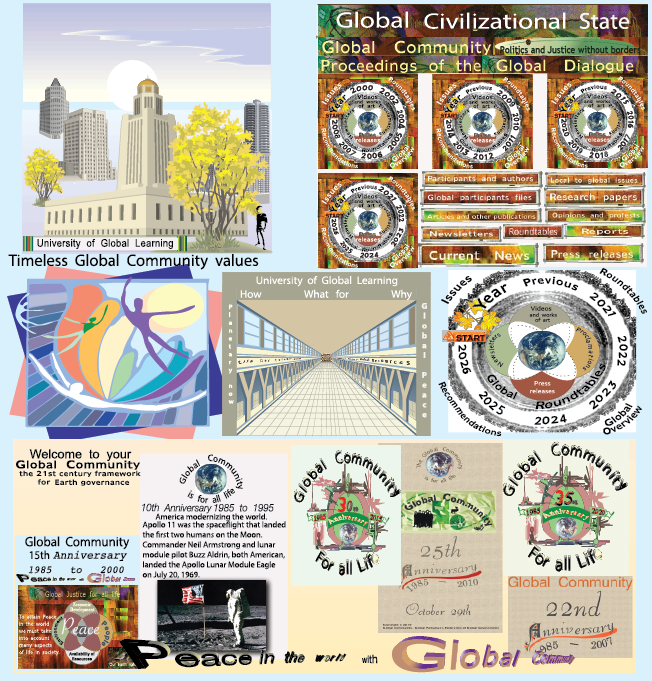
Universal health care, education, retirement security and employment services to every Global Community citizen.
We can do better united as a Global Government, a Global Parliament, the Global Civilizational State: a new world to build, and a future to share and protect together.
Let us all be united as a Federation of 9 or more Global Governmewnts.
As a replacement to the United Nations, we have formed Global Parliament with 9 or more Global Governments (GGs) and an enforceable, non-military democratic Global Constitution for all. Governing bodies consist of four chambers making the Global Parliament:
1. House of Elected Representatives
2. House of Advisers
3. House of Executive Council, and
4. Federation of Global GovernmentsThe power of Global Parliament was de-centralized to give each GG a better chance to find the right solutions to global issues. It can act faster and be more effective and efficient in the context of the Global Civilizational State, this great, wide, wonderful world made of all these diverse global communities within each Nation. Global Community becomes thus more fluid and dynamic.
GC_93
The very first step of the Federation, and maybe the only one for several decades ahead of us, would be the approval of essential services amongst the participating member nations. We want each Global Government to take a larger share of responsibility of the specific region where it operates, and be more accountable to the people of that region,and to all life on Earth. Global Community has researched and developed such services and listed them here. All of them are already in operation on a small scale.
GC_94
Today's international trade agreements are obsolete and primitive. They are formed to make a few people on the planet rich and creating a world of overconsumption and wastfully degrading the planet's resources and environment. Let us walk into a sustainable future. Let us first define what we mean by "Global Protection Agency (GPA)", and of course what we mean by "essential services" in the global context of humanity.We have the responsibility of managing Earth. The Earth ecosystem is so fragile that we have to manage it together wisely. Souls and SoulLife want to help us to manage Earth. They want to help us!
Why would the Soul of Humanity want to help us? A very simple answer! Throughout our human history we have left behind too many dead bodies, and too much destruction. Everytime a lifeform dies because of us, a Soul lost a physical form to serve SoulLife.
Everyone shares responsibility for the present and future well-being of life within Global Community . When there is a need to find a solution to a problem or a concern, a sound solution would be to choose a measure or conduct an action, if possible, which causes reversible damage as opposed to a measure or an action causing an irreversible loss.
The establishment of global institutions for sciences, health and education, and research remaining fair, loyal, through and fare within the Multicivilizational Community.

Business and the environment: Wherever there are people, there will be conflicts, and Global Community ethics can help to resolve conflicts. Global Civilizational State proposes that such conflicts be resolved without violence and within a framework of justice. People must commit themselves to the most nonviolent, peaceful solutions possible. This is the pathway to global peace.

Global Civilization issues today.
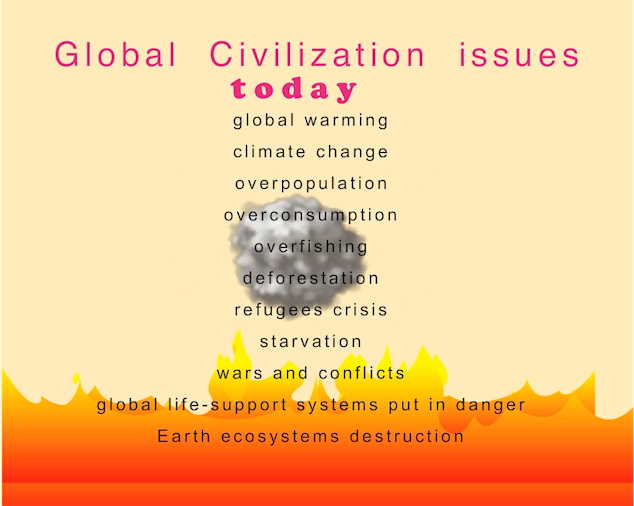
Environmental problems have contributed to numerous collapses of civilizations in the past. Now, for the first time, a global collapse appears likely and global warming, overpopulation, overconsumption by the rich and poor choices of technologies are major drivers; dramatic cultural change provides the main hope of averting calamity. Let us all protect the global life-support systems.
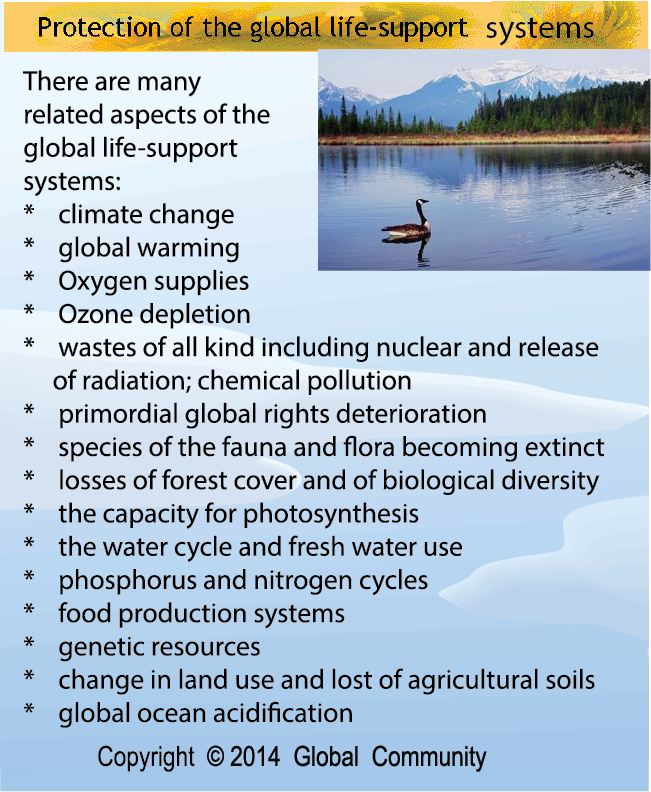
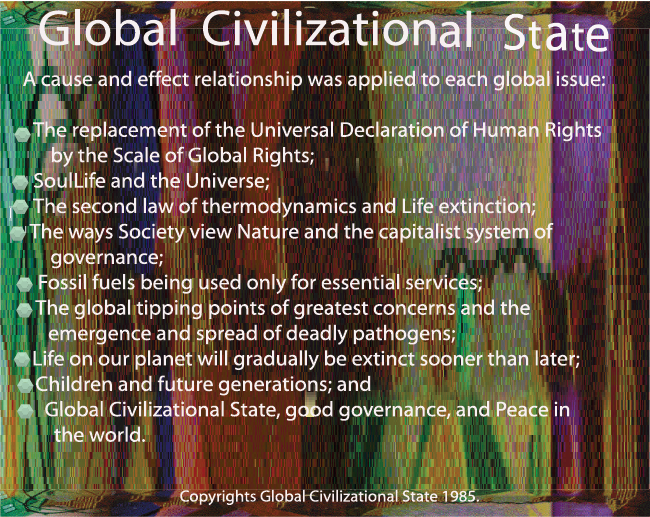
Global Civilizational State: let us all research a cause and effect relationship between each important global issue. Let us all protect world's ecosystems which reveal a widespread decline due to increasing resource demands of an overpopulated planet.
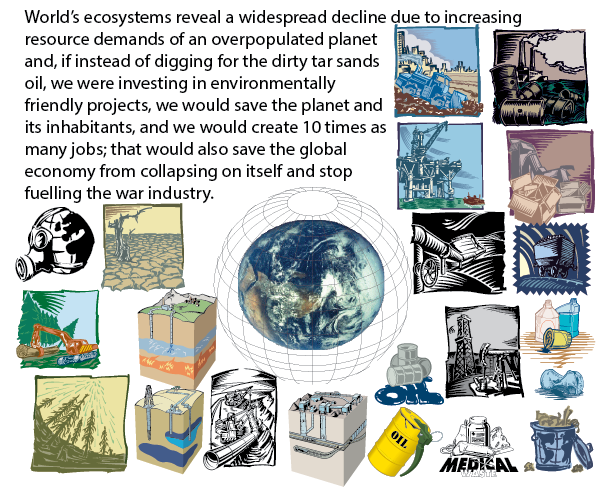
Obtaining your Certified Corporate Global Community Citizenship (CCGCC) will help you to show the world your ways of doing business are best for Global Community. Governments should encourage enterprises to use the criteria both by legal and moral means. At first, the criteria should be adopted in key areas such as procurement, facilities management, investment management, and human resources. Corporations want to be seen as good corporate leaders and have a stronger form of accountability. Business and trade will prosper after stronger common bonds and values have been established. Adopting the criteria will have a beneficial impact on future returns, and share price performance.
Obtaining the CCGCC will help businesses to be part of the solution to the challenges of globalisation. In this way, the private sector in partnership with the civil society can help realize a vision: allowing a global equitable and peaceful development and a more stable and inclusive global economy.

Observables provide support to Global Warming. Tipping points occur when global heating pushes temperatures beyond a critical threshold,leading to accelerated and irreversible impacts.
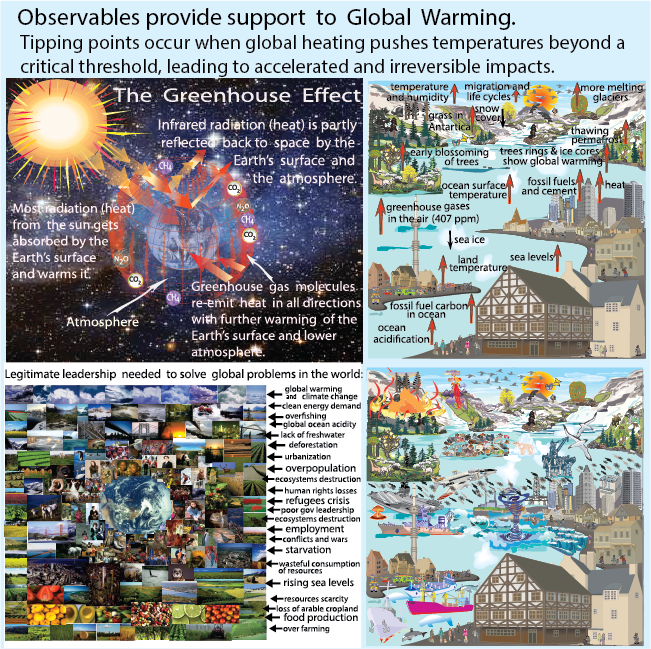
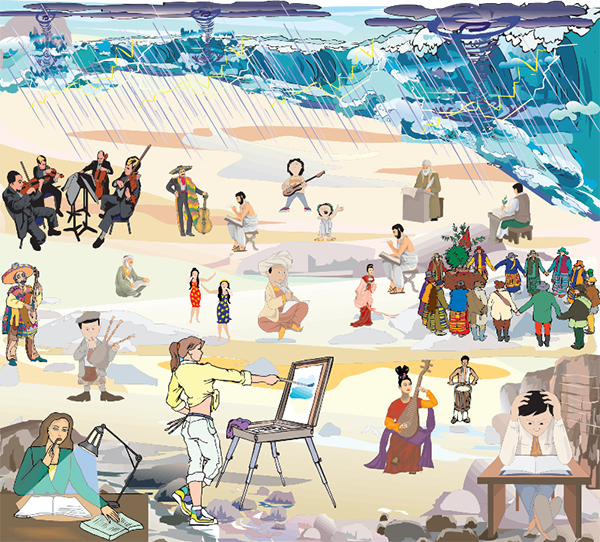
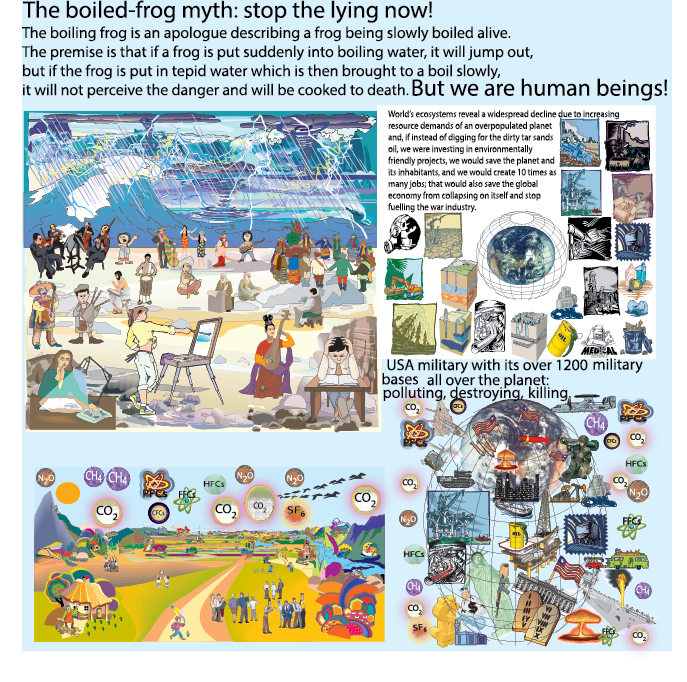
The require careful handling of global tipping points of greatest concerns and the emergence and spread of deadly pathogens. The establishment of truly needed global environmental and ecological institutions designed to manage and protect the environment, and for protecting species at risk of extinction.
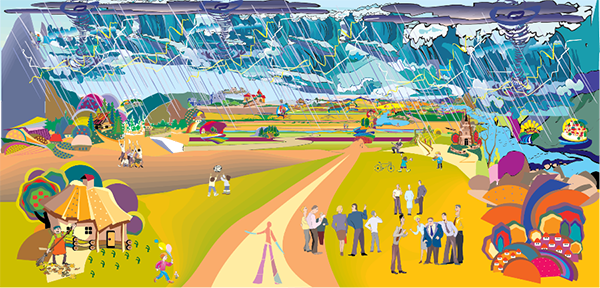
Our world is facing crises of freshwater, food, deforestation, ocean health, and destruction of the global Life-support systems. We need leadership in the protection of all our natural resources, in peril because of what we do and what that does to our planet. We are facing a fresh water crisis. We are facing a food crisis. We are facing a crisis over deforestation. And we are facing crises in our oceans. While carbon emissions from fossil fuels pollute the air, land and our oceans, we are facing the climate change crisis. Now is the time to press for a sound Global Civilizational State leadership.
Now Global Community claims that all Lifeforms are important and included as part of global ethics. It is not just about 'humanity survival' but about 'all Lifeforms survival' we are fighting for. The treatment of all Lifeforms provides a clear example of the practical value of global ethics. In the Western world (and in contrast with certain Eastern traditions) Lifeforms other than human beings have long been excluded from the domain of moral concern. They have been bred up and killed for food and clothing, captured and dissected in the name of science, and sometimes hunted for pure pleasure. This treatment has been justified in several ways. Within the Jewish and Christian religious context, for example, it is taught that God created "animals" for human use, and so we are entitled to do to them as we please. Global Community condemns this behavior because each of us depends on the well-being of the whole, and so global citizens must have respect for the community of living beings, for people, other Lifeforms, and plants, and for the preservation of Earth, the air, water and soil.
Leadership needed to solve the problem of human overpopulation.
Leadership needed to solve the problem of overpopulation, fighting global poverty, migrants, refugees, and persons who have been forced to leave their country in order to escape war, persecution, or natural disaster.
By 2100, the United Nations Population Division (UNPD) projects the human population will swell to as many as 11.3 billion people. The world human population reached one billion by 1804 and has increased seven-fold in the 200 years since. If humans take over all of Earth’s living surface, there will be no room to provide for itself, let alone room for any other living plant or animal populations.
Human population will never reach that point. If human populations continue to balloon unabated, it will essentially eradicate itself with disease, starvation, harmful and detrimental living conditions and psychological deterioration.
With so many people taking so much land that also is needed for biodiversity, agriculture and food production, transportation, healthy living and natural habitats, the question necessarily becomes, “What is going to give?”
In this way, the human species is its own enemy, perhaps innocently, but an enemy nonetheless. Zero Population Growth is attainable and is even projected as early as 2150, but we just don’t know.
Earth is finite. Earth’s resources are finite. So, populations cannot be infinite; however, the global population continues to grow, taking more and more land, using up more and more resources, demanding more and more energy and housing, and creating more and more humans.
Clearly the environmental challenges facing humanity in this century and beyond would be less difficult in a world with slower population growth or none at all.
Population is a critical variable influencing the availability of each of the natural resources considered here. And access to family planning services is a critical variable influencing population. Use of family planning contributes powerfully to lower fertility, later childbearing, and slower population growth. Yet policymakers, environmentalists and the general public remain largely unaware of the growing interest of young people throughout the world in delaying pregnancies and planning their families. In greater proportions than ever, girls want to go to school and to college, and women want to find fulfilling and well-paid employment. Helping people in every country to obtain the information and services they need to put these ambitions into effect is all that can be done, and all that needs to be done, to end world population growth in the new century.
Global Ministry of World Population.
Reproductive health services can help. Voluntary family planning and other reproductive health services can help couples avert high-risk pregnancies, prevent unwanted childbearing and abortion, and avoid diseases such as HIV/AIDS and other sexually transmitted infections, that can lead to death, disability, and infertility.
Comprehensive reproductive health services, especially care in pregnancy and childbirth and for sexually transmitted infections, are key to preventing disability and death and improving women's health. Better access to emergency care during childbirth and safe abortion services would also contribute significantly to lower maternal death rates. Family planning diminishes risks associated with frequent childbearing and helps reduce reliance on abortion.
An important obstacle to couple negotiation of contraceptive use and protection from STDs including HIV is that most women have unequal access to resources and decision-making. Yet women are more vulnerable to the consequences of unplanned pregnancies and often HIV/STI's. For these reasons, countering the prevailing gender stereotypes that increase risky behaviors and decrease couple communication is a key strategy for promoting good reproductive health.
Individuals, too, can help bring about a world that is more secure and more supportive of life, health and happiness. They can educate themselves on population dynamics, consumption patterns and the impact of these forces on natural resources and the environment. They can be socially, politically and culturally active to elevate the issues they care about. They can become more environmentally responsible in their purchasing decisions and their use of energy and natural resources. And individuals and couples can consider the impacts of their reproductive decisions on their communities and the world as a whole.
Population dynamics are among the primary underlying causes of forest decline. Poverty, corruption, inequitable access to land and wasteful consumption practices also influence the decisions of governments, corporations and individuals to cut and clear forests. The interaction of these forces is most evident in areas such as South Asia, Central America and sub-Saharan Africa, where poverty, rapid population growth and weak institutions contribute to forest loss and severe environmental degradation.
The dominant force in forest loss is growth in the demand for farmland. Subsistence agriculture is the principal cause of forest loss in Africa, Asia and much of Latin America. Slash-and-burn farming and other traditional techniques were sustainable for centuries when population densities were lower. Today they are a major factor, along with the expansion of commercial farms and livestock grazing areas, in the permanent conversion of wooded land to agriculture. The need to increase food production is expected to accelerate the forest-to-farmland cycle, especially in countries where alternatives for meeting this demand are limited.
A typical American uses 15 times as much lumber and paper as a resident of a developing country. Reducing wood consumption in the industrialized world is unlikely to stop forest loss in developing countries however, since most of the wood consumed comes from trees in the industrialized countries themselves. Nevertheless, the consumption model offered to the rest of the world threatens accelerated forest loss as both populations and economies grow in developing countries.
Population policies based on human development and the Scale of Global Rights offer the greatest hope for the future of forests. This is not an argument for population "control" but for the social investments that allow couples to choose when to have children and how many to have. Programs linking conservation activities with family planning services show promise for achieving both the sustainable use of forests and greater acceptance of reproductive health services.
Sustainable wood consumption is essential for the future of forests. Individuals and institutions alike should promote the ecologically sound and socially responsible use of forest products. Eco-labeling, or the environmental certification of wood products, could speed the adoption of more sustainable forestry practices. Consumer demand for green-certified paper and other wood products is an important complement to recycling and other efforts to reduce wood consumption.
GC_95
The worst environmental degradation happens in wars. Farm products in fields and livestock are abandoned, there is no more control on toxic wastes, and water, air,and land are polluted. People are displaced and feel no longer responsible for the quality of life in their communities. Historically, the industrialized nationshave caused the most damage to the environment, with their careless technology and policies. Emissions from factories and vehicles have causedozone depletion and acid rain.Global Community faith is about realizing this new global order will be better, safer, and more realistic after replacing the 1948 Universal Declaration of Human Rights 1948 Universal Declaration of Human Rights by Scale of Global Rights Scale of Global Rights.
To determine rights requires an understanding of needs and reponsibilities and their importance.
Replacing the 1948 Universal Declaration of Human Rights by the Scale of Global Rights Scale of Global Rights.
GC_96
The Scale shows social values in order of importance and so will help us understand clearly the rights of a community and its citizens. So now Global Community ethics includes a process based on Scale of Global Rights. Global citizens have a binding responsibility for the welfare of all humanity and care for all life on Earth. Global Community ethical grounds are practical, real, and applicable for all women and men of good will, religious and non-religious.In 1985, Scale of Global Rights (.mp4 (20 MB) Scale of Global Rights) was first proposed as a replacement to the Universal Declaration of Human Rights. After several decades of research and development, many global dialogues, we still find the Scale as the best solution to global problems. Today, we are presenting once more the Scale as the best educating tool to bring about the change the people of the world need to achieve for their own survival.
Global Community offers both a short term solution and a long term solution to the people of all nations. Both solutions have been integrated into the Scale of Global Rights Scale of Global Rights, itself a necessary first step which must be approved by all of us.
GC_97
Scale of Global Rights contains six (6) sections. Section 1 has more importance than all other sections below, and so on. Concerning sections 1, 2, and 3, it shall be Global Civilization highest priority to guarantee these rights to their respective Member Nations and to have proper legislation andimplement and enforce global law as it applies and as shown in the Global Constitution.
GC_97
The Scale is a balancing process to sustain all life on the planet now and future generationsConcerning sections 1, 2, and 3, it shall be Global Community highest priority to guarantee these rights to Member Nations and to have proper lesgislation and implement and enforce global law as it applies.
Section 1. Ecological rights and the protection of the global life-support systems
Section 2. Primordial human rights
- safety and security
- have shelter
- 'clean' energy
- 'clean' and healthy environment
- drink fresh water
- breath clean air
- eat a balance diet
- basic clothing
- universal health care and education
- employment for all
Section 3. The ecological rights, the protection of the global life-support systems and the primordial human rights of future generations
Concerning Sections 4, 5 and 6, it shall be the aim of Global Community to secure these other rights for all global citizens within the federation of all nations, but without immediate guarantee of universal achievement and enforcement. These rights are defined as Directive Principles, obligating Global Community to pursue every reasonable means for universal realization and implementation.
Section 4. Community rights, rights of direct democracy, the right that the greatest number of people has by virtue of its number (50% plus one) and after voting representatives democratically.
Section 5. Economic rights (business and consumer rights, and their responsibilities and accountabilities) and social rights (civil and political rights)
Section 6. Cultural rights and religious rights
Scale of Global Rights definition
Definition of the Scale of Global Rights




On the Scale of Global Rights primordial human rights and the protection of the global life-support systems (ecological rights) are on top of the Scale. They are the most important aspects on the Scale. For instance, the existing and future uses of water are constantly challenged; balancing supply and demand is made even harder by the amounts of pollution found in the air, land and waters. A large part of our body is made of water, and we cannot live without water; therefore water is a primordial human right by our very nature.
Human beings have a moral obligation to protect and conserve the biodiversity of life on Earth. The Global Constitution shows us how it can be done with Global Law, the Earth Court of Justice, and how the Global Protection Agency (GPA) and the Agency of Global Police (AGP) can protect the territory. Global Community Arrest Warrants can be issued to anyone breaking Global Law.
Leaders of the wealthier nations must be willing to accept responsibility for past mistakes and to help pay the financial burden for environmental protection of the developing nations. This is the most damaging conflict of interests between the rich industrialized countries and those that are poor and struggling just for existence. Global Community must help wealthy and poorer nations reach a better understanding of each other's needs.
All aspects are interrelated: peace, human rights and the environment. The poor is more concerned with ending starvation, finding a proper shelter and employment, and helping their children to survive. Environmental issues become meaningless to the poor. In reality, all concerns are interrelated. As soon as the environment is destroyed beyond repair, human suffering is next. Ecology has no boundaries. All nations suffer the effects ofair pollution, global warming, loss of biodiversity, soil erosion, acid rain, ozone depletion, silting of streams, and countless of other environmental problems. This was the reason for proposing the Scale of Global Rights to Global Community.
Global Community ethics offer fundamental moral behaviors and irrevocable standards.You need not be religious to make this vision yours. This vision is for all human beings regardless of their social origin, language, culture, sex, skin color or religion.Global Community vision creates new hopes, standards, ideals and goals for everyone to embrace freely, and live a life without fear.
Actions for the good of all as per the Statement of Rights, Responsibilities, and Accountabilities.
The political system of an individual country does not have to be a democracy.

Global Community must now direct the wealth of the world towards the building of local-to-global economic democracies in order to meet the needs for food, shelter, universal healthcare, education, and employment for all.
Global Economic Model proposed by Global Community is truly the best response to the world.
Direct democracy and global voting on issues
Creation of a biodiversity zone protection all around the planet by way of Earth rights and taxation of natural resources
There are a large body of work of articles, papers and reports concerning the need to protect our environment and Global life-support systems. We are showing here a few.
It is the same idea for any consumer product. You manufacture, produce, farm or createa product, you become responsible and accountable of your product from beginning to end (to the point where it actually becomes a waste; you are also responsible forthe proper disposable of the waste).
People in our society often argue that their manufacturing products and the trading principles or rules that regulate their actions are all legal! But what about ethical values and moral principles?!
GC_99
Climate change is definitely at the top of the most global important issues facing our planet today. While this issue primarily focuses on global warming, changes in precipitation, air quality, biodiversity, “habitable” zones and many other areas are part of and affected by climate change. However, it is extreme global climate change that would result in epic disruption if not outright decimation of the human species and most life as we know it today. We have already seen the death and destruction wreaked by monster typhoons and hurricanes, unexpected volcanic activity, monsoons, extreme heat and extreme cold systems.History has demonstrated for over three billion years that life can adapt and new species can and will evolve, including humans. Humans are highly adaptable, and they are roaming and nomadic. The same goes for many lifeforms – fauna and flora — which we have seen migrate as weather conditions and trends change. There are other earth-threatening phenomena that pose far greater challenges to humanity than global climate change.
With Earth’s hottest temperatures normally hovering at 115°F (46.1°C) and reaching as high as 136°F (57.8°C) in the middle east and western portions of the United States and the coldest temperatures averaging around -50°F in Asia where humans live, there is potential for that perfect storm to trigger multiple extreme weather conditions worldwide. Still humans may survive, but the species could be seriously emaciated and unable to sustain itself.
Our world is facing crises of freshwater, food, deforestation, ocean health, and destruction of the global Life-support systems. We need leadership in the protection of all our natural resources, in peril because of what we do and what that does to our planet. We are facing a fresh water crisis. We are facing a food crisis. We are facing a crisis over deforestation. And we are facing crises in our oceans. While carbon emissions from fossil fuels pollute the air, land and our oceans, we are facing the climate change crisis. Now is the time to press for a sound Global Civilizational State leadership.
Environmental problems have contributed to numerous collapses of civilizations in the past. Now, for the first time, a global collapse appears likely and global warming, overpopulation, overconsumption by the rich and poor choices of technologies are major drivers; dramatic cultural change provides the main hope of averting calamity.
GC_100
In consequence of globalization, the new economic and political distribution of power around the world has become very different then we were used to. It has become very fluid, in perpetual motion and affected by global markets. Giant new markets are forming all over the world. Competition is hardening. National economies can no longer insure or guarantee rights of possession on any property. National borders no longer mean protection, security, cultural boundaries, resources ownership, political and economic control.International market regulations try to control or ease the effects of globalization. The effects are often devastating. With globalization comes global problems such as:
* unemployment in industrial nations
* poverty increases world-wide ~ entire countries in a state of starvation
* environmental degradation
* national interests of a country changing and becoming more trade oriented and trying to go with the wave of global trade
* international interests of a country take prime importance
* in developing countries, national debts constrict the institutions of the national state and contribute to the destruction of the economic activity which, in turn, as the effect of creating unemployment
* national currencies of many countries are affected by national debts and contribute in destroying social Life, creating ethnic conflicts and civil wars
* the large corporation is becoming larger and getting more power and control falls into the hands of a few people
* globalization is another way of keeping control on our lives in the hands of a few people
* with globalization, we have no control and no say in our future and the world becomes a game played by a few people just as it has alway been through history, leading to revolutions and war
* with globalization there is no sense of direction and meaning, no security for the individual, just a few people getting richer and controlling us all.
By 2100, the United Nations Population Division (UNPD) projects the human population will swell to as many as 11.3 billion people. The world human population reached one billion by 1804 and has increased seven-fold in the 200 years since. If humans take over all of Earth’s living surface, there will be no room to provide for itself, let alone room for any other living plant or animal populations.
But human population will never reach that point. If human populations continue to balloon unabated, it will essentially eradicate itself with disease, starvation, harmful and detrimental living conditions and psychological deterioration.
With so many people taking so much land that also is needed for biodiversity, agriculture and food production, transportation, healthy living and natural habitats, the question necessarily becomes, “What is going to give?”
Earth is finite. Earth’s resources are finite. So, populations cannot be infinite; however, the global population continues to grow, taking more and more land, using up more and more resources, demanding more and more energy and housing, and creating more and more humans. In this way, the human species is its own enemy, perhaps innocently, but an enemy nonetheless. Zero Population Growth is attainable and is even projected as early as 2150, but we just don’t know.
Clearly the environmental challenges facing humanity in this century and beyond would be less difficult in a world with slower population growth or none at all.
Population is a critical variable influencing the availability of each of the natural resources considered here. And access to family planning services is a critical variable influencing population. Use of family planning contributes powerfully to lower fertility, later childbearing, and slower population growth. Yet policymakers, environmentalists and the general public remain largely unaware of the growing interest of young people throughout the world in delaying pregnancies and planning their families. In greater proportions than ever, girls want to go to school and to college, and women want to find fulfilling and well-paid employment. Helping people in every country to obtain the information and services they need to put these ambitions into effect is all that can be done, and all that needs to be done, to end world population growth in the new century.
Global Ministry of World Population.
Reproductive health services can help. Voluntary family planning and other reproductive health services can help couples avert high-risk pregnancies, prevent unwanted childbearing and abortion, and avoid diseases such as HIV/AIDS and other sexually transmitted infections, that can lead to death, disability, and infertility.
Comprehensive reproductive health services, especially care in pregnancy and childbirth and for sexually transmitted infections, are key to preventing disability and death and improving women's health. Better access to emergency care during childbirth and safe abortion services would also contribute significantly to lower maternal death rates. Family planning diminishes risks associated with frequent childbearing and helps reduce reliance on abortion.
An important obstacle to couple negotiation of contraceptive use and protection from STDs including HIV is that most women have unequal access to resources and decision-making. Yet women are more vulnerable to the consequences of unplanned pregnancies and often HIV/STI's. For these reasons, countering the prevailing gender stereotypes that increase risky behaviors and decrease couple communication is a key strategy for promoting good reproductive health.
Individuals, too, can help bring about a world that is more secure and more supportive of life, health and happiness. They can educate themselves on population dynamics, consumption patterns and the impact of these forces on natural resources and the environment. They can be socially, politically and culturally active to elevate the issues they care about. They can become more environmentally responsible in their purchasing decisions and their use of energy and natural resources. And individuals and couples can consider the impacts of their reproductive decisions on their communities and the world as a whole.
Population dynamics are among the primary underlying causes of forest decline. Poverty, corruption, inequitable access to land and wasteful consumption practices also influence the decisions of governments, corporations and individuals to cut and clear forests. The interaction of these forces is most evident in areas such as South Asia, Central America and sub-Saharan Africa, where poverty, rapid population growth and weak institutions contribute to forest loss and severe environmental degradation.
The dominant force in forest loss is growth in the demand for farmland. Subsistence agriculture is the principal cause of forest loss in Africa, Asia and much of Latin America. Slash-and-burn farming and other traditional techniques were sustainable for centuries when population densities were lower. Today they are a major factor, along with the expansion of commercial farms and livestock grazing areas, in the permanent conversion of wooded land to agriculture. The need to increase food production is expected to accelerate the forest-to-farmland cycle, especially in countries where alternatives for meeting this demand are limited.
A typical American uses 15 times as much lumber and paper as a resident of a developing country. Reducing wood consumption in the industrialized world is unlikely to stop forest loss in developing countries however, since most of the wood consumed comes from trees in the industrialized countries themselves. Nevertheless, the consumption model offered to the rest of the world threatens accelerated forest loss as both populations and economies grow in developing countries.
Population policies based on human development and the Scale of Global Rights offer the greatest hope for the future of forests. This is not an argument for population "control" but for the social investments that allow couples to choose when to have children and how many to have. Programs linking conservation activities with family planning services show promise for achieving both the sustainable use of forests and greater acceptance of reproductive health services.
Sustainable wood consumption is essential for the future of forests. Individuals and institutions alike should promote the ecologically sound and socially responsible use of forest products. Eco-labeling, or the environmental certification of wood products, could speed the adoption of more sustainable forestry practices. Consumer demand for green-certified paper and other wood products is an important complement to recycling and other efforts to reduce wood consumption.
The total number of people worldwide could still double or even triple from today’s 7.9 billion before stabilizing a century or more from now. Women in most countries are still having more than the two-child average consistent with a stable population size. Moreover, so many young people are now entering or moving through their childbearing years that even a two-child average would still boost population size for a few decades until the momentum of past growth subsides. Yet there is reason for optimism. The combination of access to family planning and other reproductive health services, education for girls and economic opportunity for women could lower birthrates enough to stabilize world population well before a doubling of today’s total.
Motivation, rather than differential access to modern contraception is a major determinant of fertility. Individuals frequently respond to scarcity by having fewer children, and to perceived improved economic opportunity by having more children. Economic development does not cause family size to shrink; rather, at every point where serious economic opportunity beckons, family size preferences expand.
A) Foreign aid conveys to the recipients the perception of improving economic wellbeing, which is followed by an increase in the fertility of the recipients of the aid.
B) Migrations from regions of low economic opportunity to places of higher economic opportunity result in an increase in the fertility of the migrants that persists for a generation or two. The need is not to control population growth. Governments cannot control childbearing and attempts to do so have sometimes led to coercive approaches to reproduction that violate human rights. The need is rather to expand the power individuals have over their own lives, especially by enabling them to choose how many children to have and when to have them.
Investing in education for girls helps them to contribute to their national economies–and to postpone childbearing until they are ready for a family. Providing credit and other economic opportunities for women creates alternatives to early and frequent childbearing. Finally, better access to quality reproductive health services directly benefits women and their families. These approaches increase human capacity, providing the greatest long-term return to societies, individuals and the environment. Moreover, they are likely to lead to an early peak in world population in the coming century.
Comprehensive population policies are an essential element in a world development strategy that combines access to reproductive health services, to education and economic opportunities, to improved energy and natural resource technologies, and to healthyer models of consumption and the "good life." Policies to decrease world population:
delay reproduction until later in life Delaying reproduction is important in influencing population growth rates. Over a period of 60 years, if people delay reproduction until they are 30 years old, you would have only two generations, while if you do not delay reproduction you would have three generations (one generation every 20 years).
spread your children farther apart
to have fewer children overall
government commitment to decreasing population growth Create policies that help decreasing the number of children being born. Policies such as income tax deductions for dependent children and maternity and paternity leaves are essentially pronatalist and should be eliminated.
programs that are locally designed and that include information on family planning and access to contraceptives
educational programs that emphasize the connection between family planning and social good
The vast disparities in reproductive health worldwide and the greater vulnerability of the poor to reproductive risk point to several steps all governments can take, with the support of other sectors, to improve the health of women and their families:
Give women more life choices. The low social and economic status of women and girls sets the stage for poor reproductive health
Invest in reproductive health care
Encourage delays in the onset of sexual activity and first births
Help couples prevent and manage unwanted childbearing
Ensure universal access to maternal health care
Support new reproductive health technologies
Increase efforts to address the HIV pandemic
Involve communities in evaluating and implementing programs
Develop partnerships with the private sector, policymakers and aid donors to broaden support for reproductive health
Measure Progress
GC_101
Global Community is declaring a moratorium on immigration all over the world, on all applications for immigration, until applicants from any religious or cultural background have satisfied completely Global Community standard for a population fertility rate of 1.3 children per family. The problem with world overpopulation is everybody’s problem. We are all responsible. Until tangible progress is made no immigrants should be accepted. That is Global Law.Population warfare It is the use of a very high fertility rate to conquer a nation, and that could mean as many as or more than 2.1 children per family. It is a form of cultural and/or religious aggression and invasion by having a much too high number of new born babies. For instance, there has been a rapid increase in population among Muslims to the extent that in fifty years all of Europe and North America are expected to be mostly Islamic. The influx of Latino immigration into the western states of the USA will also have the effect of a population warfare. Family is important.
Family with too many children is a problem. No one can feed, educate, and take care of a family with a large number of children. Think of the world population today and in the coming decades, as a family with already far too many members. We all know world population on our planet as overreach its safe and secure capacity. Our family is breaking down, suffering, crying, hungry, dying, tortured, and in great danger of extinction. Our family is out of control, abused, taken advantage of by the 1% of its members, and by promoting democracy and human rights destructively.
The first addendum to the paper published for the month of October 2022 Newsletter "Executive order concerning the replacement of the Universal Declaration of Human Rights by the Scale of Global Rights."
Return to the paper published for the month of October 2022 Newsletter "Executive order concerning Vision of the world to save all life on our planet."
The first addendum to the paper published for the month of September 2022 Newsletter "Executive order concerning capitalism vs democratic socialism".
Return to the paper published for the month of September 2022 Newsletter "Executive order concerning Global Community's survival."
The first addendum to the paper published for the month of August 2022 Newsletter. "Executive order concerning Global Parliament, all of Humanity's new vision of the world."
Return to the paper published for the month of August 2022 Newsletter "Executive order concerning the historical formation and essential services of a Global Government."
Return to May 2022 Newsletter Odesa, a global civilizational community, and a multicivilizational community of Ukraine in grave peril.
Return to May 2022 Newsletter Global Civilizational State, Global Parliament recognised that the Donbas includes Luhansk and Donetsk republics, and are now a part of the Russian Federation.
Return to May 2022 Newsletter Global Civilizational State, Global Parliament recognised that the Donbas includes Luhansk and Donetsk republics, and their independence and sovereignty as independent states.
Return to April 2022 Newsletter Global Civilizational State, Global Parliament recognised that the Donbas includes Luhansk and Donetsk republics, and their independence and sovereignty as independent states.
Return to March 2022 Newsletter Global Civilizational State, the multicivilizational State.
Return to February 2022 Newsletter SoulLife guiding the formation, evolution and protection of Life in the world.
Return to January 2022 Newsletter SoulLife guiding the formation, evolution and protection of Life throughout the Universe.
Return to October 2021 Newsletter Global Ministry of Essential Services.



Choose an issue shown either in the:
and submit your work concerning the issue.
Send an email specifying the issue you wish to be part of. globalcommunity@telus.net Then follow the link in GIM or the Portal and see your work added along with the work of others. At the end of Global Dialogue 2008, the Global Overview will mention your work and recommendations will be writen.
A group discussion is created when two or more people dicuss an issue by email, and the back and forth discussion is published on the Global Community website for others to read and discuss further.
The House of Elected Representatives, the House of Advisers, and the Global Governments Federation together are the Global Parliament. The Peoples of the Global Community elect, nominate or appoint their representatives to Earth Government.
Global Parliament shall, jointly with the Earth Executive Council, enact legislation, and exercise the budgetary function, as well as functions of political control and consultation as laid down in the Global Constitution.
Global Parliament shall elect its President and its officers from among its members.
The folowing are some of the sections related to the House of Advisers and copied from the Global Constitution.
Chapter 14.1 A) Global Parliament
A.1 The House of Elected Representatives
A.2 The House of Advisers, and
A.3 Global Governments Federation.
Article 1: Global Parliament
1. Global Parliament shall, jointly with the Earth Executive Council, enact legislation, and exercise the budgetary function, as well as functions of political control and consultation as laid down in the Constitution. Global Parliament shall elect the President of the Federation of Global Governments.
2. Global Parliament shall be elected by direct universal suffrage of all the Global Community citizens in free and secret ballot for a term of five years. Representation of the Global Community citizens shall be of one Elected Representative per million people. Sufficiently in advance of the Parliamentary elections, the Federation of Global Governments shall adopt by unanimity, on the basis of a proposal from Global Parliament and with its consent, a decision establishing the composition of Global Parliament, respecting the principles set out above.
3. Global Parliament shall elect its President and its officers from among its members.
Article 2: Composition of Global Parliament
1. Global Parliament shall be composed of three bodies, designated as follows: the House of Elected Representatives, to represent Global Community directly and equally;
2. The Federation of Global Governments , to represent the nations of the world;
3. House of Advisers with particular functions to represent the highest good and best interests of humanity as a whole; and
4. All members of Global Parliament, regardless of body, shall be designated as Members of Global Parliament.
The House of Elected Representatives shall be elected by direct universal suffrage of all the Member Nations citizens in free and secret ballot for a term of five years. Representation shall be of one Elected Representative per million people.
GGNA Global Parliament shall, jointly with the GGNA Executive Council, enact legislation, and exercise the budgetary function, as well as functions of political control and consultation as laid down in the Global Constitution.
GGNA Global Parliament shall elect its President and its officers from among its members.
Law of land and property ownership of the Roman Empire to today.
The resolution of the dilemma of democracy can be found in a three-factor (land, labor, capital) macroeconomic approach. The products resulting from the interaction of land and labor are rightfully held as individual private property, while land and all other natural resources are recognized as the common heritage.Once the human right to the earth is firmly established in the minds and policies of a democratic majority, land will no longer be taken by the few from the many either by the force of military might or by the mechanisms of the market.
The market's ability to place value, combined with the efficiency of money as an exchange medium, results in a range of prices for land sites and natural resources. Those who simply own earth resources, contribute nothing as such to the productive process. Yet under the current private property ethic, they are in an advantageous position of power and can extract the ransom of a 'ground rent' from both labor and productive capital.
But if we now apply the common heritage principle to land and all other natural resources, then it follows that ground rent, which is a measure of natural resource value, must be treated as 'common property'. A way to affirm the equal right of all to the common heritage is to collect the ground rent for the benefit of the Global Community, a policy we call 'land value taxation'.
Confiscatory taxes on labor and productive capital should gradually be removed, as the value of earth natural resources becomes the proper source of funding for the community.
The land problem is the root cause of the wealth gap. The costs to the planet are high when wealth and power spiral into the hands of so few. Loss of species and topsoil, deteriorated air and water quality, global warming and climate change - the list of catastrophes and potential catastrophes grows each day. Those with clear vision frequently feel frustrated by lack of power and financing to remedy these problems.
Roman law developed the ownership concept which legitimized the accumulation of wealth by a few at the expense of the impoverishment of the many. The concentration of property in private hands began very early in Rome and was indeed based on the foundational and legitimizing idea of absolute and exclusive individual ownership in land. This was the same idea which would come to form the basis of the slave-owning, the feudal, and the capitalist economic systems successively. Modern civilization has not yet discarded this antiquated ownership concept, which was originally derived from ancient Rome. In fact, this is one of the main roots of the present global crisis in which the rich becomes richer and the poor becomes poorer.
The right of land ownership and of free bargaining in land are subordinated to the fundamental right of man to obtain the necessities of life. In the force of the fundamental claim of the Commonwealth there is no unconditional right of land ownership. - Pope Paul VI, Populorum Progressio, 1967.
Every man, as a living being gifted with reason, has in fact from nature the fundamental right to make use of the material goods of the earth. - Pope Pius XII When it comes to property ownership it is the value of the improvement only, and not the earth itself, that is individual property...Every proprietor owes to the community a ground rent for the land which he holds. Landlords grow richer in their sleep without working, risking, or economizing. The increase in the value of land, arising as it does from the efforts of an entire community, should belong to the community and not to the individual who might hold title. Do what we may, we can accomplish nothing real and lasting until we secure to all the first of those equal and inalienable rights with which.... man is endowed by his creator - the equal and inalienable right to the use and benefit of natural opportunities, all Earth natural resources.
When humanity first discovered a way to control fire at will, humanity dreamt about all the benefits of such power over Nature and, over the thousands of years following this discovery, humanity realized all its dreams of having this control. It was good, and more. A matter of survival! Humanity was discovering itself as we are doing today with Global Law.
Global Law is like the control over fire. Global Law is the control over ourselves as a species, our human nature, for our own survival. Humanity discovering itself. We know Global Law is needed! Humanity knows it is a matter of survival. We know it in ourselves just like humanity knew the control over fire was going to be beneficial. Let us all dream about the benefits of Global Law, and what they will do to our survival as a species. Dreams will be realized soon after. More likely sooner than later.
During the past thousands of years humanity has lived with the life program information transferred into the brain via two ways: our genes, and education and upbringing. The mechanism of biological information protection did the rest. We are lock, stock, and barrel with the old stock. In a way! Today our species is evolving to rid itself of the old thoughts that are threatening its future and survival. This is a survival reaction and is very real. Our species will accomplish the evolutionary leap within a generation. The next step is the creation of new thoughts, thousands of them. Healthy thoughts! The kind that will sustain Earth. This was accomplished through the Global Dialogue process.

There is a way to make things right for all life on Earth. We have to face the fact that the species survival reaction is here and is growing. We see today the seeds of this reaction which includes all social, political and religious aspects of our lives. All of our ways and values are changing and evolving. Global Civilization is giving proper guidance.
The establisment and working of Global Law is now the goal to achieve.
The control over fire now requires the control of ourselves as a People, one humanity, as the Global Community, over the destructive impacts of our activities on the planet. We just need to use our brain a bit more, that is to understand better what we are doing to the global environment and the global life-support systems, and to act accordingly.
Over time, the control over fire has had consequences that can bring about our own destruction, the end of humanity and of life on Earth. Our activities are causing the global warming of the planet. Think about how this is done! A fire requires three basic elements: a burning substance, a spark and Oxygen. No fire can exist without all three elements.
Combustion or burning is a chemical reaction in which a fuel combines with Oxygen, releasing heat and producing an oxide. The commonest types of fuel are organic materials containing carbon and hydrogen, from which the waste products are typically carbon monoxide or carbon dioxide, water and sometimes smoke. It is clear that human activities are putting tremendous quantities of CO2 into the atmosphere by the burning of fossil fuels.



Vehicle exhausts, coal-burning power plant, factory smokestacks, and other waste vents of the industrial age now pump billions of metric tons of CO2 greenhouse gases into the Earth’s atmosphere each year from fossil fuel combustion.
There is evidence that concentrations of CO2 in the atmosphere are related to global temperatures. Evidence is from a variety of sources and reflects relationships between gas concentrations and temperatures over a wide range of time scales. Whenever there is an increase in CO2 concentrations there is also an increase in the temperature of the air. Since monitoring began in the 50s, fossil fuels burning was found to be the major contributor of the increase in CO2 concentrations in the atmosphere and, therefore, of the increase in air temperature causing global warming of the planet.
Concentrations have increased approximately 21% since 1958. The average rate of increase since 1958 has been about 0.4%/year, which is an absolute increase of about 1.5 parts per million by volume (ppmv). CO2 persists for a long time in the atmosphere and has a residence time in the order of decades to a century.
Greenhouse gas emissions have increased at the same rate as the overall world economic production, measured by the Gross World Product (GWP). The GWP reflects the increase in worldwide industrialization and human population levels. The use of fossil fuels in transportation, industry, heating and power generation throughout the world has increased steadily over the past 40 years. This has resulted in increases in greenhouse gas emissions.
Global warming findings predict that increased amounts of CO2 tend to increase the greenhouse effect and thus cause a man-made global warming. The widespread opinion that there is currently a warming phase and that the increased carbon dioxide amounts are a major contributor to it has led to widespread support for international agreements such as the Kyoto Protocol which aim to regulate the release of CO2 into the atmosphere.
Various scenarios of future emissions due to human activities predict that increased atmospheric concentrations equivalent to a doubling of CO2 by 2100 is unavoidable, and a tripling or greater by that time is a distinct possibility.
Now we see that the control over fire has brought us close to the extinction of our species and that of all life on the planet. We must now control our activities to benefit all life.
The burning of fossil fuels is no longer an option and need to be replaced by processes none-threatening to the global life-support systems. That is today's challenge. And that is the reason for researching and developing Global Law.
Global Law

a) The Portal of the Global Civilization is being researched and developed by members of the Executive Council of Global Ministersand by the Global Community through the Global Dialogue process

b) Global Law: Earth and human rights, Statutes, Codes, Standards, Bills and Other Legislative Information. This WWW site is maintained by the Legislative Counsel of Global Parliament, pursuant to Earth Government Global Law, its legislation. Earth Government Global Law consists of 69 codes, covering various subject areas, the Global Constitution, Bills and Statutes. Information presented reflects laws currently in effect. All Earth Government Codes have been updated to include Statutes of year 2005. Researched and developed by the Global Community
c) Global Citizens Rights, Responsibility and Accountability Act.Researched and developed by the Global Community
d) Global Constitution. We call upon the national governments and legislatures of the world to ratify the Global Constitution for Earth Government and elect delegates to the House of the Global Governments Federation. Researched and developed by the Global Community
f) Global Protection Agency (GPA). Global Protection Agency will train and lead a global force, bypassing traditional peacekeeping and military bodies such as the United Nations and NATO. This is a great opportunity for globallateralism. Researched and developed by the Global Community
g) Global Community Earth Government: Politics and Justice without borders. Prosecuting criminals on the basis of universal jurisdiction regardless of a territorial or nationality nexus requires a solid commitment of political will from national governments and the Global Community. The Earth Court of Justicewill hear cases involving crimes related to the global ministries. The Court will have a dual role: to settle in accordance with international law the legal disputes submitted to it by national governments, local communities, and in some special cases by corporations, non-government-organizations and citizens, and to give advisory opinions on legal questions referred to it by duly authorized organs and agencies. Researched and developed by the Global Community

Global Community has had work on the global law, codes and standards aspects and issues ever since 1985. A short list of our previous work on global law, codes and standards aspects and issues.
Month/year Theme and Author Read contents June 10, 2007 Global Justice for all life on the planet
by Germain Dufour, with the Global Community
The Global Community Global Justice Movement has many inter-related components: monetary, social, economic, environmental, democracy, and peace. The Global Community Global Justice Movement promotes new thinking to benefit all economies and societies – the true, fair, democratic and efficient solution to poverty. The Global Community has the productive resources to eliminate poverty and injustice. Humanity is now in the process of developing the democratic and transparent communications infrastructure which can bring this about. Our approach transcends left-wing/right-wing designations. We see both conventional capitalism and socialism as being two arms of a philosophy which concentrate power in an elite, to the detriment of society as a whole. Reforming the current money system, to empower each and every person, is a first step for justice.Read March 17, 2007 God Law, Nature Law, the teaching of the Soul of Humanity with the teaching of the prophet are fundamental pillars of our Global Law
by Germain Dufour, Spiritual Leader of the Global Community
In order to create a harmonious and compassionate Global Community, there are laws I ask everyone to comply with.Read March 16, 2007 Letter sent by Germain Dufour to the Global Community
Nature Law
Nature Law, a fundamental pillar of our social valuesRead March 9, 2007 The Crime of War in Iraq , by DR. Charles Mercieca , International Association of Educators for World Peace, Professor Emeritus, Alabama A and M University, Environmental Protection, Human Rights & Disarmament What is the purpose of having rules and regulations when we can disregard them at will at any moment we like? Since the early days of human existence, those that transgressed rules and regulations to the detriment of others always tended to be punished, sooner or later. In order for us to understand the seriousness of such violations, we need to understand properly the significance of laws. In order to do that, we must have a clear concept of the four hierarchical laws of which ascetical writers spoke over the past several centuries. Read March 2, 2007 The Criminality of War, by DR. Charles Mercieca , International Association of Educators for World Peace, Professor Emeritus, Alabama A and M University, Environmental Protection, Human Rights & Disarmament Read February 14, 2007 The third option: Global Law, the need to have it, and the benefits (Part II) , by Germain Dufour Read

Building global communities
Direct democracy
Elections and voting
The threat of organized crime to the sovereign state and to world order
Freedom, security and justice without borders (Part II)
- Introduction

- Crimes of racism, xenophobia and discrimination

- Fundamental human and Earth rights

- Global Community Arrest Warrant

- Police cooperation

- Criminal sanctions

- Fight against corruption and organized crimes

- Fight against terrorism

- Fight against trafficking in human beings

- Fight against ship Captains and owners dumping waste oils in oceans

- Fight agaisnt car and truck manufacturers using fossil fuels

- Fight against overfishing and bottom trawling

- Fight against deforestation

- Fight against child pornography on Internet (third report)

- The implementation of the principle of transparency in government

- Conclusion

Benefits of Global Law
Part I of this global dialogue was conducted on February 2005. Read about the report.
The global concept of freedom, security and justice without borders was then integrated into the framework of the Global Constitution.

Building global communities requires a mean to enforce global law that protects all life on Earth. The Global Protection Agency (GPA) will train and lead a global force, bypassing traditional peacekeeping and military bodies such as the United Nations and NATO. This is a great opportunity for globallateralism. And that is the third option we offer the Global Community.
Building global communities require understanding of global problems this generation is facing. There are several major problems: conflicts and wars, no tolerance and compassion for one another, world overpopulation, human activities, as population increases the respect and value of a human life is in decline, insufficient protection and prevention for global health, scarcity of resources and drinking water, poverty, Fauna and Flora species disappearing at a fast rate, global warming and global climate change, global pollution, deforestation, permanent lost of the Earth's genetic heritage, and the destruction of the global life-support systems and the eco-systems of the planet. We need to build global communities for all life on the planet. We need to build global communities that will manage themselves with the understanding of the above problems.
Humanity is going through a phase of global consciousness. We see entire nations making choices based on what is good for themselves, today self-interests, versus what is good for the next generations and all life on the planet. In other words, they make choices between international politics versus global politics. International politics are driven by national interests, self-interests, while Global politics are about the survival of all of us on the planet.
Global politics is about doing what is right for all of us now and in the future, and for all life on the planet. We base our understandings and actions on principles we all know are right deep down. You cannot have a nation invading another nation for its resources? its water? its oil and gas? We have chaos without principles! We have conflicts and wars. There are ways of doing things that will give everyone a good survival chance. There are global equitable and sustainable solutions. War goes against global sustainability and global peace.
Global politics are meant to guide us on the right path. They are meant to bring humanity on a safe ground. They are about the survival of all of us of the planet. This is what people who work hard, pay their taxes and play by the rules want from their political leaders. You don't expect politicians to be perfect. But you do want to know that your tax dollars - money you've worked for - are being spent properly and wisely.
As we have shown in the Global Constitution,
the Global Community is defined as being all that exits or occurs at any location at any time between the Ozone layer above and the core of the planet below.
This is an important concept and particularly useful in the context of the Global Governments Federation.
One could think of a typical community of a million people that does not have to be bounded by a geographical or political border. It can be a million people living in many different locations all over the world. The Global Community is thus more fluid and dynamic. We need to let go the archaic ways of seeing a community as the street where we live and contained by a border. Many conflicts and wars will be avoided by seeing ourselves as people with a heart, a mind and a Soul, and as part of a community with the same. The Global Community is this great, wide, wonderful world made of all these diverse global communities.
The Global Community has established the criteria of 'a global community of a million people'.
There is no need of having a piece of land at all costs. We have shown that a community is not about a piece of land you acquired by force or otherwise. A typical global community may be what a group of people, together, wants it to be. It can be a group of people with the same values. It can be a group of people with the same cultural background, or the same religious background. Or it can be people with different values, cultural background or religious values and beliefs. The people making a global community may be living in many different locations on the planet. With today's communications it is easy to group people in this fashion. It can be a village, or two villages together where people have decided to unite as one global community. The two villages may be found in different parts of the world. It can be a town, a city, or a nation. It can be two or more nations together.
It is best for humanity and the increasing world population to see ourselves as people living together or far apart but in constant communication with each other. A community has no boundaries except of those of the heart, mind and Soul. Many conflicts and wars will be avoided by seeing ourselves as people with a heart, a mind and a Soul (a global community), and as part of a community with the same. You should seek forming a Global Government (GG) with nations of similar beliefs and interests.
Some important members of the Global Community: the global civil society, the Earth Community, the human family, all different ways of expressing the same people. The global civil society is made of people from all aspects of life who have a greater understanding of the problem whatever it may be. The global civil society is the mind, heart and Soul of Humanity, the human family. They maybe NGOs, businesses, agencies, scientists and professionals, religious groups, or other groups. They have a voting right during all meetings of Global Parliament. They are given an important status in Global Community Earth Government (GCEG).
And that is the 'raison d'etre' of the House of Advisors in GCEG. You will be required to send representatives to your House of Advisors.
In this way, GCEG has made lobbying restricted by the Global Constitution and Global Law. The Global Citizens Rights, Responsibility and Accountability Act
defines further the conditions and limits of lobbying groups.
A global symbiotical relationship
between two or more nations, or between two or more global communities, can have trade as the major aspect of the relationship or it can have as many other aspects as agreed by the people involved. The fundamental criteria is that a relationship is created for the good of all groups participating in the relationship and for the good of humanity, all life on Earth. The relationship allows a global equitable and peaceful development and a more stable and inclusive global economy.
The emphasis of a global symbiotical relationship is not so much on how much money a nation should have or how high a GDP should be although money can be made a part of the relationship. We all know developed countries live off developing countries so the emphasis has no need to stress out the profit a rich nation is making off a poor nation. The emphasis of the relationship should give more importance to the other aspects such as quality of life, protection of the environment and of the global life-support systems, the entrenchment of the Scale of Human and Earth Rights
and Global Law into our ways of life, justice, peace, cultural and spiritual freedom, security, and many other important aspects as described in the global ministries (health, agriculture, energy, trade, resources, etc.).
The Global Community is promoting the settling of disputes between nations
through the process of the Earth Court of Justice.
Justice for all is what we want. Justice is a universal value for anyone, anywhere, and in any situations. Justice is to be applied to the military as well. Everyone! Every business and organization!
Rights of direct democracy are defined in Chapter 10.6.3 of the Global Constitution,
and in Article 10 of Chapter 9.
It is defined as a community right. Direct democracy is the right of global citizens to hold referendums on any issue -- and to veto legislation.
Direct Democracy implies that:
- Global Citizens are willing and able to participate fully in the decision making process on issues that most affect them.
- Global Citizens should have full access to information on global affairs, and the conduct of global business should be open and transparent, with a well-developed global-wide communication system.
- Global Parliament should always recognize that it is accountable to Global Citizens.
- Direct democracy will encourage global citizen input into global policy, and enable Global Citizens to participate more actively in global affairs.
- Direct democracy will raise the level of public awareness and encourage debate of key global issues.
- Global Parliament can exercise the leadership necessary to become a model of effective “direct democracy” for all global communities.
- A direct democracy global law gives Global Citizens and Global Parliament an effective and orderly way of addressing contentious issues.
- A direct democracy global law strengthens the hand of Global Parliament by providing additional credibility in dealing with senior governments and non-elected bodies.
- A direct democracy bylaw shows that Global Parliament has faith in its Global Citizens. Thus, Global Parliament in turn earns increased respect from Global Citizens.
- Direct democracy does not mean government by referendum. Almost all Global Parliament decisions would continue to be made as they are now with the usual consultative processes. Few issues would be important and contentious enough to prompt referenda.
Direct democracy is important to sustain life on the planet but its position on the Scale of Human and Earth Rights
gives it its overall importance. 'Direct democracy' is very much like a voting system based on 'proportional representation'.
There are many different aspects of 'direct democracy'. For instance, in a single riding there may be as many as 8 seats and and several candidates running. Parties offer voters a slate of local candidates. Voters can rank candidates of the same party, but may also choose to give support to candidates of different parties. Voters rank as many or as few candidates as they wish. Voters can rank any number of candidates without fear their vote will be wasted by selecting unpopular candidates.
A voter’s rankings will be considered in order until that voter’s ballot can be used. When your number one choice is eliminated for lack of support your number two becomes your first choice. When a voter’s ballot is used in support of a given candidate, but that candidate has a surplus of votes, a ballot’s unused portion will be transferred to the voter’s next choice until a ballot’s full value has been used.
Most votes will count, little fear of wasting one’s vote, no fear of vote splitting. No need to support a candidate or party you don’t really want for fear of helping elect those you like even less. You can vote authentically. This is freedom for voters.
This is how democracy is supposed to work. This voting system empowers voters more than parties because votes are for candidates not for parties. Also, candidate selection will take place at the local riding level, not at party head office. Most importantly, voters will rank candidates of the same party as well as candidates of different parties. It maximizes choice for voters. Competition is not just between candidates of different parties but also between candidates of the same party.
This voting system is also a measure of independence from party control and that will make a very significant contribution to greater accountability in government. It will yield a legislature that mirrors the political, social, ethnic, and geographic diversity of a population.
Electing candidates in multi-member ridings ensures a broader range of political interests and issues will be represented than is possible under any other system. Preferential voting induces a politics of cooperation, consensus, and civility.
Direct democracy comprises a form of democracy and theory of civics wherein all citizens can directly participate in the political decision-making process. Some proposed systems would give people both legislative and executive powers, but most extant systems allow input into the legislative process only. Direct democracy in its traditional form is rule by the people through referenda.
The people are given the right to pass laws, veto laws and withdraw support from a representative (if the system has representatives) at any time.
Direct democracy in its modern sense is characterized by three pillars:
- Initiative
- Referendum including binding referenda, and
- Recall
The second pillar can include the ability to hold a binding referendum on whether a given law should be scrapped. This effectively grants the populace a veto on government legislation. The third pillar gives the people the right to recall elected officials by petition and referendum.
In Canada, the use of citizens' assemblies (also known as an estates-general in the province of Quebec), involving citizen bodies chosen at random, is growing and avoids the disadvantages of older, more plebiscitary forms of direct democracy. The province of British Columbia recently set up a Citizens' Assembly on Electoral Reform in which members were chosen at random for each riding. The citizens' assembly has just recommended the province use Single Transferable Voting (STV) to elect the provincial legislature. In a referendum conducted on May 17, 2005, 57% of the voters approved by this new system of voting.
Over the last year, many people throughout the world have experienced, firsthand, the fundamental principle of democracy - the right, the duty and the power of voting. With this comes a sense of the efficacy of the electoral process.
Although democratic elections support peaceful, democratic changes, the electorates' voices rise only to address perceived national concerns. We need to extend the right to vote to the global level. We have the right to determine and then act upon issues that affect the world and humanity as a whole, such as the environment, economics, technology and conflict resolution. The Universal Declaration of Human Rights, in Article 21(3), affirms the right to vote:
"The will of the people shall be the basis of the authority of government; this will shall be expressed in periodic and genuine elections which shall be by universal and equal suffrage and shall be held by secret vote or by equivalent free voting procedures."Democracy is what Global Community wants. Direct democracy is a very useful form of democracy to be used for very important global issues.




Because of modernization, global politics today is being reconfigured along cultural lines and civilizations. And of course, Global Civilizational State is finally giving its historical place as the global solution to saving humanity, and all other lifeforms on Earth, from complete extinction. Peoples and countries with similar cultures are coming together. Alignments defined by ideology and superpower relations are giving way to alignments defined by culture and civilization. A civilization may also include people who share in and identify with its culture, but who live in states dominated by members of another civilization. Civilizations usually have one or more places viewed by their members as the principal source or sources of the civilization's culture. These sources are often located within the core state or states of the civilization, that is, its most powerful and culturally central state or states.
In modern era, Western civilization, the West, is referred to the European-American civilization and America has become the land of freedom, equality, opportunity, the future, and is a distinct core-state civilization. Not so much ideologies, simply economics and politics now differentiate peoples of different civilizations. Nevertheless, cultures, ways of life, ways of doing things have been the most distinguishing characteristics. Those characteristics have been defined by religion, language, ancestry, history, communities, ethnic groups, customs, nations, and also by major levels of classification being civilizations.
In a multicivilizational world, there are core values which different ethnic and religious societies have in common. The constructive course is to renounce global culture, accept diversity, and seek commonalities. Commonalities exist between Asia and the West. Whatever the degree to which humankind is divided, the world's major religions, Western Christianity, Orthodoxy, Hinduism, Buddhism, Islam, Confucianism, Taoism, Judaism, also share key values in common. A more inclusive Global Civilizational State can emerge gradually through the exploration and expansion of these commonalities. Peace in a multicivilizational world is the finding of those commonalities and so peoples in all civilizations should search for and attempt to expand the values, institutions, and practices they have in common with peoples of other civilizations.
Now, let us have a more specific definition and understanding of non-Western civilizations. Non-Western societies, such as those in East Asia, are expanding their economic wealth, political strength, military power, claiming their own cultural values and letting go those constrained on them by the West. Nations with cultural similarities cooperate economically and politically. For instance, East Asian economic success has its primary source in East Asian culture. Power has shifted from the predominant West to non-Western civilizations, and global politics has become multipolar and multicivilizational.
For China, unity is its first priority. The Chinese state enjoys a very different kind of relationship with society compared with the Western state. It enjoys much greater natural authority, legitimacy and respect, even though not a single vote is cast for the government. The reason is that the state is seen by the Chinese people as the guardian, custodian and embodiment of their civilization. The duty of the state is to protect its unity. The legitimacy of the state therefore lies deep in Chinese history. This is utterly different from how the state is seen by Western societies.
As a modern state, China accepts the concept of the sovereign equality of states and prevailing conceptions of human rights. China is unique due to the many traditions and features originating from its civilization. This is also the key conceptual difference between a civilizational state and a civilization-state. The civilizational state represents an amalgamation of an old civilization and a modern nation-state. On the other hand, a civilization-state reflects the tension between the two. As a civilizational state, China is both old and young, both traditional and modern, both Chinese and global. At least eight features can be derived from the civilizational state of China: 1) a very large population, 2) a vast territoty, 3) very long traditions, 4) a unique language, 5) richest cultural heritages, 6) a political system with Chinese characteristics, 7) a distinctive society, 8) and a unique way of running an economy.
Within China development model, the main features of the civilizational state (population, territory, tradition and culture) all constitute China's greatest strengths. China has the richest human resources and potentially the largest consumer market; China has an unparalleled geopolitical and geoeconomic status; China has its tradition of independent thinking, and has the richest cultural resources in the world. China is a civilizational state generating its own standards and values and making unique contributions to the world civilizations. China's civilizational state has a strong capability to draw on the strengths of other nations while maintaining its own identity. The Chinese people have a deep respect of Nature and have applied the secular application of ethics and political philosophy to social, economic, and political governance. Chinese culture is more inclusive than exclusive, within the broad conceptual framework of the Confucian idea of 'unity in diversity". The greatest wisdom of a civilizational state is its long tradition of seeking common ground while differences are set apart, and this wisdom is first reflected in the Chinese language.
Chinese characters are commonly made up of various components, and the components often give a hint of the pronunciation and the meaning of the word, and they are structured in such a way that they often follow the principle of "seeking common ground while reserving differences".The Chinese language seems to underline the fact that seeking commonality from diversity is a trait of Chinese culture. The governance of a civilizational state follows the same logic, and if one can focus on seeking the commonalities of different interest groups, one stands a better chance of solving the tensions among them, whether it is a tension between regions, between enterprises, between social groups, between rich and poor, or because of global right issues.
Over ancient time to this day, morality in society made its way into our ways of doing business. So the set of behaviors that constitute Global Civilizational State ethic for a business also evolved largely because they provided possible survival benefits to increase evolutionary success. Consequently, peoples evolved socially to express emotions, such as feelings of empathy or guilt, in response to these moral behaviors. Humans developed truly moral, altruistic instincts. When looking across cultures of geo-cultural areas and across millennia, certain virtues have prevailed in all cultures, the major ones include:
wisdom, knowledge, courage, justice, love, truth, empathy, kindness, and social intelligence.These virtues were not always incorporated into the ways of doing business because the 1% super rich businesses became corrupted, greedy, no longer in line with humanity's survival on the planet, and more interested in keeping most of the wealth, resources and power for themselves keeping the remaining 99% of the world population in poverty. But today, Global Civilizational State incorporates these virtues and proper behaviors into corporate citizen global ethics.
Global Civilizational State ethics for a business are about how we treat others and a commitment to respect every person humanely and with dignity. For this process to work, global citizens learn to forgive, be patient and compassionate, promote acceptance, open theirs hearts to one another, and practice a culture of solidarity and cooperation. Let go narrow differences between us all for the greater good of humanity and future generations.
Economic and political power must be used as a service to humanity instead of misusing it in ruthless battles for domination. Global Community faith can help to develop a spirit of compassion with those who suffer, with special care for the children, the aged, the poor, the disabled, and the refugees.
We need ways of organizing ourselves to help us live in a world with less energy and to grow strong caring communities in which we get more of our human satisfaction from caring relationships and less from material goods. We need to reclaim the ideal of being a democratic middle-class people without extremes of wealth and poverty. We need to recover a deep sense of community that has disappeared from many of our lives. This means letting go a sense of ourselves as consumption machines. We need a Global Civilizational State leadership for all of humanity.
The increased interaction among peoples which includes trade, investment, tourism, media, electronic communication, is generating a common world culture. Improvements in transportation and communications technology have indeed made it easier and cheaper to move money, goods, people, knowledge, ideas, and images around the world. By increasing trade globally is unlikely to ease international tensions or promote greater international stability. Economic interdependence fosters peace only when states expect that high trade levels will continue into the foreseeable future, otherwise war is likely to result. Often people define their identity by what they are not. As increased communications, trade, and travel multiply the interactions among civilizations, people increasingly accord greater relevance to their civilizational identity. In an increasingly globalized world characterized by historically exceptional degrees of civilizational, societal, and other modes of interdependence and widespread consciousness, there is an exacerbation of civilizational, societal, and ethnic self-consciousness. The global religious revival, the return of the sacred, is a response to people's perception of the world as a single place, Earth, and Global Community.
Today the evidence-based argument for the appearance of a Global Civilizational State is really the result of the broad processes of modernization that have been going on since the eighteenth century. Modernization involves industrialization, urbanization, increasing levels of literacy, education, wealth, social mobilization, and more complex and diversified occupational structures. It is a product of the tremendous expansion of scientific and engineering knowledge beginning in the eighteenth century that made it possible for humans to control and shape their environment in totally unprecedented ways. Modernization is a revolutionary process comparable only to the shift from primitive to civilized societies that is, the appearance and evolution of Global Civilizational State.
In consequence of globalization, the new economic and political distribution of power around the world has become very different then we were used to. It has become very fluid, in perpetual motion and affected by global markets. Giant new markets are forming all over the world. Competition is hardening. National economies can no longer insure or guarantee rights of possession on any property. National borders no longer mean protection, security, cultural boundaries, resources ownership, political and economic control.
Environmental problems have contributed to numerous collapses of civilizations in the past. Now, for the first time, a global collapse appears likely and global warming, overpopulation, overconsumption by the rich and poor choices of technologies are major drivers; dramatic cultural change provides the main hope of averting calamity.
Today, for life survival on our planet, a distinction must be made in the developed countries between necessary and limitless consumption, between socially beneficial and non-beneficial uses of property, between justified and unjustified uses of natural resources, and between a profit-only and a socially beneficial and ecologically oriented market economy. The lives of all lifeforms and plants on our planet deserve protection, preservation, and care. Global Community disapproves of the limitless exploitation of the natural foundations of life, the relentless destruction of the biosphere, and the militarization of the space within and above the Earth's atmosphere. Global citizens must live in harmony with nature on and above the Earth's surface.
The life extinction crisis on Earth is an environmental issue and also a social justice issue, one that is linked to long histories of capitalist domination over people, other life forms, and plants. The extinction crisis needs to be seen as a key element in contemporary struggles against accumulation by dispossession. This crisis, in other words, ought to be a key issue in the fight for climate justice. The 1% people have as much wealth as half the world's population, and are controlling all economies on the planet. They stand behind an economic system based on capitalism that has institutionalized a global ignorance, in which producers and consumers cannot know or care about one another, and in which the histories of all products will be lost.
It is now increasingly evident that only by sharing the world's natural resources more equitably and sustainably will we be able to address both the ecological and social crisis we face as Global Civilizational State.
The combined effects of aggressive marketing, advertising, and planned product obsolescence mean that the American consumer’s oversized footprint is largely a consequence and reflection of the global power of Transnational Corporations(TNCs), and more specifically corporate America. Global warming and climate change denialism requires shutting one’s eyes to obvious realities when the truth is that the Earth is warmer than it has been in 120,000 years. In that sense, it is perhaps more accurate to speak of corporate ecological footprints rather than the footprints of nations or individuals. Globalization has meant the distancing of cause and effect, source and sink, so that the pollution and human exploitation caused in the production and transport of goods has remained invisible and opaque to consumers.
How can further troubles not come into being when a vicious globalized capitalism system is in existence for which maximal profits, not people and their needs, is always the overriding goal? The global socioeconomic system of capitalism is forcing us to work harder to surpass previous consumption and population numbers until we have devoured everything that maintains life, ending up with a polluted, lifeless, and scorched planet.
Although the yearning for peace is deep-seated, it has never been achieved during civilisation due to its competitive nature. If we keep capitalism, the ultimate in competitiveness, it will finish us. Peace can’t be attained with military force; one can’t fight for peace or for cooperation. Peace is now possible because we have to have it to survive. People have the intellectual and the emotional ability to work out the multitude of changes to enable us to be fully social and survive, if it’s our goal.
What would be the shape and fundamental goals of an expansive anti-capitalist movement against extinction and for environmental justice? It would have to commence with open recognition by the developed nations of the long history of ecocide. Such an admission would lead to a consequent recognition of the biodiversity debt owed by the wealthy nations of the global North to the South. Building on the demands articulated by the climate justice movement, the anti-capitalist conservation movement must demand the repayment of this biodiversity debt.
A legally imposed contraction of the fossil energy supply and a rapid global conversion to renewable energy is a necessary step toward saving our world, Earth. So what should society do to avoid the worst impacts of climate change? Capitalism is based on ceaseless compound growth that is destroying ecosystems the world over, the goal in the rich nations of the global North must be to overturn our present expansionary system by fostering de-growth. Most importantly, nations that have benefited from burning fossil fuels must radically cut their carbon emissions in order to stem the lurch towards runaway climate chaos that endangers the vast majority of current terrestrial forms of life.
To become great again, the US parlayed the world’s largest national debt, its trade deficit, budget deficit, capital account deficit and savings rate deficit, into a position in the global driver seat through the dollar remaining global hub currency. Unemployment in the USA is very low and the economy seems great only because the USA Government is having a 21 trillion dollars debt to create jobs and subsidize its industrial complex, especially its corporate military industry which actually employs more than half of America's population. This 21 trillion dollars is mostly obtained from China and handed over to the USA Federal Reserve to help America create jobs in America. Naturally, the more the dollar was used in the world, the more America had the power to spend on the military. For the US, paying a bill of 6 trillion dollars (this is the cost of the wars in Iraq and Afghanistan) has been effortless, and this constitutes an unparalleled advantage over countries like China and Russia whose military spending in comparison is a fifth and a tenth respectively.
The main source of economic reliability in America was transferred over time from gold to dollars, specifically to US treasury bills. This major shift allowed the Federal Reserve to print dollars practically without limit (as seen in recent years with interests rates for borrowing money from the FED at around 0%), well aware that the demand for dollars would never cease, this also keeping alive huge sectors of private and public enterprises such as the coal industry, fracking industry, car manufacturing, food and farming industries, and most importantly the military industry which has always giving jobs to more than half of America's population. No wonder President Trump, and several USA Presidents before him, have been claiming the lowest unemployment rate because more than half of America population works for the war industry, the industry that has produced most of the greenhouse gases globally at the expenses of the global life-support systems. This set a course for a global economic system based on financial instruments like derivatives and other securities instead of real, tangible goods like gold. In doing this for its own benefit, the US has created the conditions for a new financial bubble that could bring down the entire world economy when it bursts.
The United States found itself in the enviable position of being able to print pieces of paper (simply IOU’s) without any gold backing and then exchange them for real goods from other nations. This economic arrangement has allowed America to achieve an unparalleled strategic advantage over its geopolitical opponents (initially the USSR, now Russia and China), namely, a practically unlimited dollar spending capacity even as it accumulates an astronomical public debt (over 21 trillion dollars). The destabilizing factor for the global economy has been America's ability to accumulate enormous amounts of public debt without having to worry about the consequences or even of any possible mistrust international markets may have for the dollar. Countries simply needed dollars for trade and bought US treasures to diversify their financial assets.
The primary goal of the developed nations must be to overturn the present expansionary economic system based on capitalism by fostering de-growth and creating steady state societies founded on principles of equality and environmental justice. Most importantly, nations that have benefited from burning fossil fuels must radically cut their carbon emissions in order to stop the climate chaos that endangers the vast majority of current terrestrial forms of life.
Let us now define what economic system should be used to govern our planet. What would be best is a "democratic socialism plus". The "plus" means added essential elements for governing sustainably. For instance, people would have free health care, free education at all levels, and employment for everyone. People would control and manage natural resources at all stages: exploration, production, transportation, manufacturing and distribution. A Global Trade and Resource Ministry would be formed to look after the management of naturel resources worlwide.
"Democratic socialism plus" advocates that the control and management of natural resources be under the control of the people. The 1 % super rich people worldwide who thrive within capitalism, must be overthrown. This new way of governing can be achieve through legitimate democratic means by voting in a party that represents this way of governing. "Democratic socialism plus" implies public owership, not private ownership of natural resources.
Because of the limited quantities of Earth resources to be made available for this generation and the next ones, and because of environmental, climate change, and world population concerns, there is a need to manage the entire process of using Earth natural resources. And we all know that the amount of oil left in the ground in the world has already passed its peak quantity. So why waste the oil on doing things we know are nothing but a waste of energy and often used for destruction and certainly will shorten the life span of the next generations. A Global Trade and Resources Ministry is needed to look after the management of Earth resources and trade at all stages: exploration, production, transportation, manufacturing and distribution.
The quality of Earth governance is reflected in each local community worldwide. Global Community will show leadership by creating a global civil ethic within our ways of life. Global Constitution describes all values needed for good global governance: mutual respect, tolerance, respect for life, justice for all everywhere, integrity, and caring. The Scale of global Rights has become an inner truth and the benchmark of the millennium in how everyone sees all those values.
Earth environmental governance can only be achieved successfully within the larger context of sustainable developent and Earth management. All aspects are inter-related and affect one another. A healthy environment is essential to long term prosperity and well-being of Global Community citizens. That demands a high level of ecological protection. This is the 'raison d'etre' of the Scale of Global Rights.
Primordial human rights are those human rights that individuals have by virtue of their very existence as human beings: to live, eat, drink fresh water, breath clean air, and have shelter. These rights are separate categories than ecological rights, the right of the greatest number of people, economic rights, social rights, cultural rights and religious rights. Ecological and primordial human rights are the only rights that have existed unchanged throughout the evolutionary origin of our species. Any major change would have threatened our very existence. All other human rights listed here are rights created by human beings and can be changed depending of new circumstances; they are not stagnant but are rather flexible and adaptive, and they can evolve. Ecological and primordial human rights of this generation and of future generations are therefore much more important than any other human rights existing now and in the future.
In this way the Scale of Global Rights gives us a sense of direction for future planning and managing of the Earth. Earth management is now well defined and becomes a goal to achieve. We no longer waste energy and resources in things that are absolutely unimportant. It has also become a necessity of establishing the Global Trade and Resources Ministry that will be assessing, compiling, managing and protecting Earth resources, and the Earth Court of Justice prosecuting cases involving crimes related to the relentless misused of the Earth resources.
It's time for us to come to terms with reality. We need ways of organizing ourselves to help us live in a world with less energy and fewer material goods. We need to recover a deep sense of community that has disappeared from many of our lives. The world is in global crisis and a planetary state of emergency. We are exploiting our natural resources, minerals and fuels faster than we are gaining access to alternative sources. We are polluting the natural environment faster than the environment can regenerate itself to reach the level suitable for human needs. We are changing the global climate dangerously. Our attitude and way of life show a moral degradation toward the existing forms of life on the planet. It's time for us to protect what is left to protect: life itself on Earth. This was the reason for the creation of a planetary biodiversity zone. Global Civilizational State has shown the benefits of biodiversity to humanity and hope this approach will motivate others to help create the zone.
The stewardship of the ecological base has to be given priority before the fulfilment of various economic and social wishes. All families need shelter, food, language, body of knowledge, certain skills, a source of income. Security of the home is an important aspect for any family and Global Civilizational State it belongs to. Primordial human needs raise the question of interacting universal responsibilities. In terms of parenthood, parents must raised their children mentally and physically healthy. It is a responsibility to do so. Which also means each local community must have an educational system to help parents raise the child. On the Scale of Global Rights primordial human rights and the protection of the global life-support systems and of ecological rights are on top of the Scale. They are the most important aspects on the Scale.
As global crises of all sorts further intensify, the Global Community may have no alternative but to show solidarity and help each other out of crises, and such solidarity can only be built on the basis of harmony and moderation, and on respecting the political and cultural diversity of this troubled world. A successful Global Civilizational State for all life on Earth is on the horizon. Let us lead the world toward a Global Civilizational State.
Yet, the main reason that the whole mess will be curbed is a simple one: infinite growth, whether economic growth or population growth, cannot continue indefinitely. Anyone who believes exponential growth can go on forever in a finite world is either a madman or an economist. Accordingly, one can envision that a crash is coming. In large measure, it's because environmental tipping points are already on the way and, for those people in the worst locations for the collapse -- the desperation, conflicts and chaos will likely be horrific in scale and ferocity.
How could they not be when our governments worldwide and the status quo do not encourage our transitioning to a steady state economy, business based on regionalized commerce and a cooperative inclusive economic arrangement rather than out of control global competition, "democratic socialism plus" rather than capitalism? How can further troubles not come into being when a vicious globalized capitalism system is in existence for which maximal profits, not people and their needs, is always the overriding goal? Despite its desirably from many standpoints, how can an alternative scheme be put in place when it bumps up against the prevailing paradigm and the corporatists -- the powerful über-elites that control the gargantuan transnational companies and our fawning government toadies?
Earth has long been waiting for a truly global governing body based on universal values, global rights, global concepts and democracy. We might as well start this new way of doing things creating process now, there is no longer any reason to wait. But then Global Civilizational State is already here. As never before in history, common destiny beckons us to seek a new beginning. It requires a new sense of global interdependence and universal responsibility. We must develop and apply the vision of a sustainable way of life locally, nationally, regionally, globally, and within ourselves throughout life. Our cultural diversity is a precious heritage and different cultures will find their own distinctive ways to realize the vision.
Global Civilizational State has now a Vision of the Earth in Year 2024 and a sense of direction. Global Civilizational State embarks on a new path in history, the inevitability of global societies living, sharing, and creating symbiotical relationships interactively is, beyond doubt, that which we must confront. Our creativity today may influence tomorrow's socio-economic strategies and contribute to the evolution of human societies - an evolution directed towards a global partnership and cooperation with each other for survival.
In order to build a sustainable global community, each individual, each local community, and national governments of the world must initiate their commitment to Global Civilizational State. Global Civilizational State was defined as a social, and political movement in the sense of having a broad organizational structure and an ideology aimed at governing. The environmental movement, within Global Civilizational State, expresses the concerns of groups of people regarding depletion of water, clean air, climate change aspects, degradation of land and other changes in ecosystems affecting traditional patterns of natural resources exploitation . Global Civilizational State has taken the role of helping these groups in protecting and managing the environment by coordinating their efforts.
Global Civilizational State is aware that religious beliefs, traditional customs and standards could burden the sustainability of all life on Earth. They could burden Earth society or any society forever, and holds individuals in a straitjacket. We cannot accept that. No one can! There are choices to be made, and we must make them. Cultures can develop and can go on developing. Even religious beliefs may evolve. We are living now, and we are able to create these changes. We are at least as bright, most certainly brighter, than the people who were living thousand of years ago.
Global Civilizational State opposes environmental, economic, population and military warfares. Global Civilizational State was first to oppose any type of invasion of a people by another people. An invasion is either an environmental, economic, population or military offensive in which large numbers of combatants of one geopolitical entity aggressively enter territory owned by another such entity, generally with the objective of either conquering; liberating or re-establishing control or authority over a territory; forcing the partition of a country; altering the established government or gaining concessions from said government; or a combination thereof.
An invasion can be the cause of a war, be a part of a larger strategy to end a war, or it can constitute an entire war in itself. Due to the large scale of the operations associated with invasions, they are usually strategic in planning and execution. Global Civilizational State has been witnessing such different types of walfares for decades. And now is time to stop all types of invasion no matter what they maybe.
Overpopulation worlwide is a crisis. Everyone is responsible and are required now by Global Civilizational State to follow Global Law as defined and developed by Global Community.
Symbiotical relationships are needed today for the long term future of humanity and for the protection of life on Earth. Humanity needs to slow down significantly world population. This 21st century is very crucial for humanity as it will determine our survival or not as a species and, consequently, the survival of the next generations. It is now increasingly evident that only by sharing the world's natural resources more equitably and sustainably will we be able to address both the ecological and social crisis we face as Global Civilizational State. This does not imply that a section of the world population whose idea of survival is to have many children and Global Community would see that they are given all social services needed for survival.
No! There are global laws concerning procreation and everyone is required not to have more than 1.3 children per family in a given population. Global population warfare is not permitted, much like military and economic warfares in the world today. All other life species than human are also part of Global Community and their population will also be protected for their own survival.
Population warfare definition (as defined by Global Civilizational State in 1985): use of a very high fertility rate to conquer a nation, and that could mean as many as or more than 2.11 children per family. It is a form of cultural and/or religious aggression and invasion by having a much too high number of new born babies. For instance, there has been a rapid increase in population among Muslims to the extent that in fifty years all of Europe and North America are expected to be mostly Islamic. The influx of Latino immigration into the western states of the USA will also have the effect of a population warfare.
Global Community Ministry of World Population.

Ministry of Global Peace in government.
Moratorium on world population and the fertility rate, and ending population warfare.

Clearly the environmental challenges facing humanity in this century and beyond would be less difficult in a world with slower population growth or none at all.
Population is a critical variable influencing the availability of each of the natural resources considered here. And access to family planning services is a critical variable influencing population. Use of family planning contributes powerfully to lower fertility, later childbearing, and slower population growth. Yet policymakers, environmentalists and the general public remain largely unaware of the growing interest of young people throughout the world in delaying pregnancies and planning their families. In greater proportions than ever, girls want to go to school and to college, and women want to find fulfilling and well-paid employment. Helping people in every country to obtain the information and services they need to put these ambitions into effect is all that can be done, and all that needs to be done, to end world population growth in the new century.





